![]()

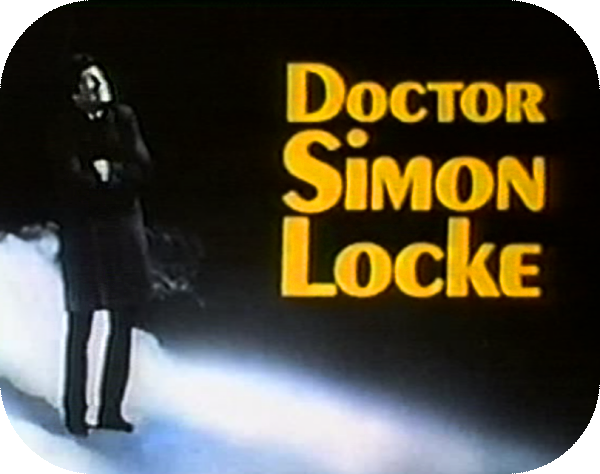
If this series was out on videotape or DVD, I would be really surprised! (But I'd buy it.) RetroTV started showing this series on March 30, 2016, under the blanket title Police Surgeon. So go thank the nice folks at RetroTV. Followup: apparently the package was sold to them with three episodes missing: "The Wanderer," "Marooned," and the elusive "Gun Point." They located "The Wanderer," but they're still hunting up the others, so this is why those two episodes have stock TV Guide-type descriptions.)
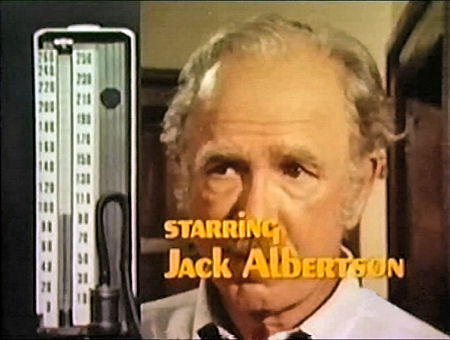 |
Albertson is Dr. Andrew Sellers, the crusty but familiar family doctor who has practiced medicine in the small farming community of Dixon Mills for as long as some of the younger residents can remember. Sellers is so fond of his work and patients that he lost his great love to his devotion for practicing medicine. The clinic is located in a large, rather ornate but run-down home that is Sellers' for the duration of his medical practice, with a makeshift laboratory in the basement and beds for sick patients in the spare bedrooms. Andrew's only other interest is his garden and his greenhouse where he raises roses. He loves poetry and quotes poems several times in the series. |
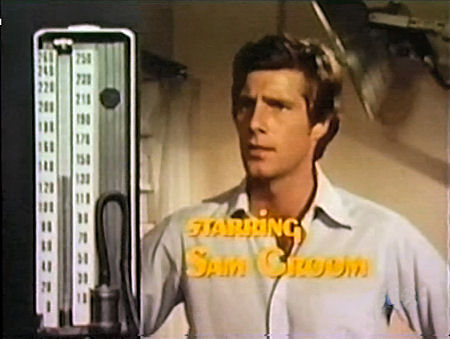 |
Groom is the 30-ish Dr. Simon Locke, who has abandoned a lucrative, but unrewarding, practice in the big city. He tells Sellers he is sick of catering to hypochondriacs and whiners, and has come to the country to practice "real" medicine. He's a bit taken aback at how little equipment the Dixon Mills clinic has, and is famous for cobbling up odds and ends to suit needs: saved a premature baby using a cardboard box, an oxygen tent, a plastic tarp, and a heat lamp borrowed from a stable; made a defibrillator from a car battery, jumper cables, a voltage panel, and capacitors out of Dr. Sellers' television; and did an emergency caesarian in a cabin using kitchen knives with a potato masher as a retractor. He's earnest to the point of being blunt, but sincere. The townspeople are slow to warm to him, but he perseveres. |
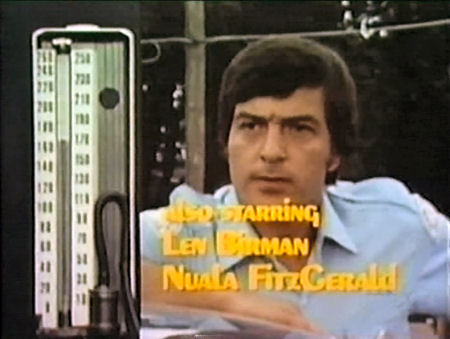 |
Birman plays Chief Dan Palmer, the head of the Dixon Mills police force. Like Locke, he is dedicated, driven, and often so blunt that he's borderline rude. He's continually suspicious of Simon Locke's motives in moving to a small town after having practiced in the city and continually needles him, and the two are always locking horns (and sniping) over one thing or the other. Palmer is a helicopter pilot (he flies the Dixon Mills police "chopper"), lives in a rustic cabin, and in his free time plays piano, so, yeah, he's got his sensitive side despite his classic "Dan scowl." He also speaks French. |
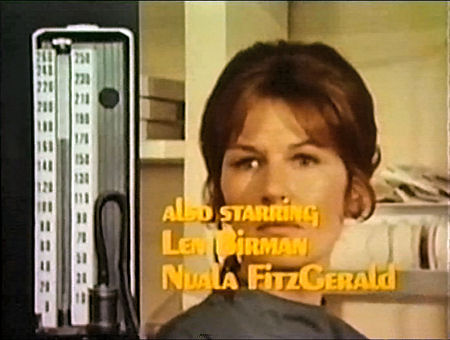 |
Nuala FitzGerald is Nurse Louise Wynn, who assists the doctors at the clinic. Nurse Wynn is a widow and a supremely competent nurse; Dr. Sellers admits that most times she can handle medical situations in the clinic on her own. She's delivered twins by herself and will treat minor injuries. She's either called "Wynn" (by Dr. Sellers and Chief Palmer), or "Mrs. Wynn" by Dr. Locke. When work at the clinic gets busy, Mrs. Wynn's sister is usually called in to help. |
The producers were Chester Krumholz and Wilton Schiller. The series was filmed in Kleinburg, Ontario. The house exteriors and interiors were filmed at the Valley Halla Estate near the Toronto Zoo. According to Wikiwand, some other scenes were shot at Highland Creek in Scarborough, Ontario (possibly the water scene in "Walden Lost," the concluding scene of "Two Points of a Pitchfork," the opening shot of "The Healer," and Locke dunking Palmer's head in "The Man Who Hunted Hunters"). (Perhaps also the creek in "The Meddler.")
Dr. Simon Locke has entered the annals of television history as a series where what went on off screen was often more interesting than its onscreen presence. One of the first original series produced after the FCC's Prime Time Access Rule, it ran from 1971 through 1972. I initially began putting this web page together in 2008 and finally brought it to fruition in 2014, and was finally able to expand it thanks to the showings on RetroTV. And by posting it I'm probably tempting being haunted by the ghost of Jack Albertson, who...ah, but read on.
Origins
The original premise of the series: a young, hotshot doctor reads an advertisement in a medical journal—the series was prompted by producer Wilton Schiller seeing a newspaper story about how difficult it was for country physicians to find younger doctors to practice with them—and accepts a position in the small rural town of Dixon Mills, which consists mostly of farm families, to act as associate to an elderly doctor who's realizes that the vast territory he must cover to keep up with his practice—remember, these were the days of house calls—is getting a bit difficult for one person to cope with. (I have seen references to Dixon Mills as being in Canada, but it was intended to be a typical small American town, perhaps in the northern New England states or upstate New York, or in the upper peninsula of Michigan). The nearest hospital, Hargrove (or Harkness; it changes from script to script), is so many miles away that emergency patients are usually airlifted there in the police helicopter. The younger physician has big ideas about bringing modern medicine to "the sticks" and immediately clashes with the older doctor, who knows that the patients in the surrounding countryside are used to an old family practitioner type, not a young hotshot with radical ideas. The idea would be to explore both Dr. Locke's new methods and Dr. Sellers' old ones and see whether the new, the old, or a combination of the two would be the best.
At least that was the concept presented Jack Albertson when he accepted the part of Dr. Sellers, his first starring television role, although he had already achieved success on stage and on the screen (a Tony Award and an Academy Award for his role in The Subject Was Roses) and had co-starred on such television series as The Thin Man and Ensign O'Toole. Done properly with a seasoned actor such as Albertson and the talents of Sam Groom, who played the original adult Russ Matthews on the daytime serial Another World, Locke could have been an interesting, if still minor, bit of drama. Its producers had good bloodlines: they had both worked on Ben Casey, did the pilot film to McMillan and Wife, and both worked on Mannix.
Changes
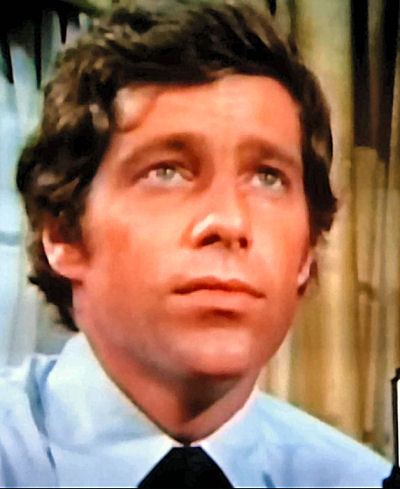 It's possible to still see the original concept in the pilot episode, where Dr. Sellers testily confronts Dr. Locke by asking him why he showed up when Sellers couldn't even coerce a mere medical student to join his practice, and later berates Locke for not having unpacked; he figures the younger man is bailing out after his first case. (Actually, Locke's been so busy with his first case that he hasn't had time to unpack.) Pilot-version Sellers is gruffer, adversarial, pushes liquor on Locke almost as soon as he arrives, and frequently badgers him throughout the episode. Locke's original attitude toward patients is also in evidence when Sellers asks him to consult on the case of the woman who complains of a "lump on her neck." Locke does an examination, feels only her collarbone, and figures she's malingering, just like some of the city patients he so hated. It takes Sellers to show him that the woman works hard seven days a week serving three meals a day and cleaning up after a husband, three sons, and a half-dozen farmhands. Every once in a while she just can't face any more work and "calls in sick" so her menfolk can do for her instead. This patient psychology Locke has never considered. He tells Sellers he is in Dixon Mills to "practice medicine, and leave the rest to the social workers, the church, and City Hall."
It's possible to still see the original concept in the pilot episode, where Dr. Sellers testily confronts Dr. Locke by asking him why he showed up when Sellers couldn't even coerce a mere medical student to join his practice, and later berates Locke for not having unpacked; he figures the younger man is bailing out after his first case. (Actually, Locke's been so busy with his first case that he hasn't had time to unpack.) Pilot-version Sellers is gruffer, adversarial, pushes liquor on Locke almost as soon as he arrives, and frequently badgers him throughout the episode. Locke's original attitude toward patients is also in evidence when Sellers asks him to consult on the case of the woman who complains of a "lump on her neck." Locke does an examination, feels only her collarbone, and figures she's malingering, just like some of the city patients he so hated. It takes Sellers to show him that the woman works hard seven days a week serving three meals a day and cleaning up after a husband, three sons, and a half-dozen farmhands. Every once in a while she just can't face any more work and "calls in sick" so her menfolk can do for her instead. This patient psychology Locke has never considered. He tells Sellers he is in Dixon Mills to "practice medicine, and leave the rest to the social workers, the church, and City Hall."
It's very possible the pilot's actors tested well but the sponsors felt that the conflict between the doctors and Locke's single-minded dedication to his profession made Locke unlikable and Sellers look grumpy and perhaps a bit senile. (If this is so, I must reluctantly agree with them. Sellers and Locke sniping at each other over the treatment of each case would have become too wearying.) So by the time the series went into production after the pilot sold, the producers had changed the concept slightly. For the remainder of the series Drs. Sellers and Locke chiefly cooperated with each other with occasional flareups; Locke's antagonist became the cynical local sheriff, Dan Palmer, who pooh-poohed Locke's giving up a good city salary and thought his nice-guy attitude was too good to be true. Locke's character is also significantly softened by the end of the series, particularly illustrated by his attitude to an elderly character in the episode "Quiet Sunday."
If the character rewrite wasn't bad enough, the producers' parsimony was just that proverbial "straw that broke the camel's back" for Jack Albertson. This wasn't totally Schiller and Krumholz's fault—they'd been given a budget of only $50K per episode for everything (script, actors, crew, the works), which today probably wouldn't even be an adequate budget for craft services alone. Both Albertson and Groom were aware this wasn't a big-budget series, but they at least expected some sort of dressing room arrangement. Instead they found themselves changing clothes behind trees, bushes, barns, and other outdoor venues and behind studio flats because the producers wouldn't spring for any type of changing area. The series filmed in Canada mostly during the winter (when you see snow in this series, it's real snow, not soap flakes) and Albertson, Groom, and the other actors frankly froze their behinds off. Eventually they brought a nondescript Winnebago RV for the actors to change in; it does double-duty appearing in some of the episodes, like "The Meddler." John Meredyth Lucas, who wrote and/or directed about half the episodes, recalls in his book Eighty Odd Years in Hollywood that during the pilot one of the crew wailed "Who do I have to f*** to get off this picture?" (In one of the funny connections that happened with this old-doctor/young-doctor themed series, the pilot episode interiors were filmed in the Massey Mansion, home of Vincent Massey, the first Governor General of Canada. Vincent Massey's more well-known younger brother, actor Raymond Massey, was famous for many things, including being the "old doctor" character in NBC's classic "old doctor/young doctor" pairing on Dr. Kildare.)
Other situations besides freezing costume changes bothered Albertson as well; the actors were forbidden to watch the "dailies" of each day's production. When they finally did see the episodes, Albertson, the consummate professional, saw bad takes, visible boom mikes, erratic sound, dropped cues, and was appalled that reshoots had not been called for, and was finally fed up enough to demand out of his contract. When the producers of the series told him they'd take him to court, he countered that he would tell any court exactly what he'd been through on the set and declared "No jury would convict me." The producers, noticing the series wasn't performing well in the ratings anyway, released Albertson and scrapped the entire "city doctor goes country" concept, decided they wanted something "edgier" and more "relevant," and joined the cop series bandwagon. The series was renamed Police Surgeon, Locke was transformed into a crime-fighting...well, you get the idea...and bizarrely Chief Dan Palmer was also transferred to the city, now becoming Locke's boss, Lieutenant Dan Palmer. (Len Birman later left the series and was replaced by prolific voice-and-character actor Larry D. Mann—now most well-known as "Yukon Cornelius" in the television Christmas perennial Rudolph the Red-Nosed Reindeer)—as Lieutentant Jack Gordon.)
Transitions
Soon after, Jack Albertson had a guest starring role in the McMillan and Wife pilot, which his Locke producers worked on. I often wonder if he said anything to them.
For my own part, as cheap as the production values were—to further hold down production costs, the series was filmed on videotape like a soap opera, a practice that only acerbated bad scenes and indifferent performers—I enjoyed the "country doctor" theme more and quit watching Police Surgeon sometime in its first year (after Len Birman left the cast). A cop show was a cop show was a cop show, just more dull stories about fighting drug pushers, addicts, muggers, con men, grifters, murderers, and various other low-lifes. Ho-hum. Besides that, I was a Jack Albertson fan, and Albertson in a mediocre show was better than no Albertson in a somewhat better one. Even today, upon second viewing in which creaky dialog and stilted characters stand out, the series has a unique quality: medical shows, cop shows, and lawyer shows dominated the 1970s, and all the previous medical television dramas—Medical Center, Ben Casey, Dr. Kildare, Medic, the doctors segment of The Bold Ones—had big-city settings; even Marcus Welby was stuck in the suburbs close to big city hospitals. Locke was the first show* to tackle a country practice, and in hindsight it resembled a James Herriot saga with humans rather than animals: a country practice with far outlying patients, house calls, inclement weather, traditional beliefs clashing with new ideas, lack of modern equipment, a hospital being last resort. A pilot episode scene where Locke drives to the Morgan farm, over 30 miles from town, gets his car stuck in a snowdrift, and must walk over snow the rest of the way is straight out of All Creatures Great and Small where Herriot finds himself in the same predicament; earlier in the same episode Sellers tells Locke that the patients don't pay him per service, they give him a dollar a month, which is the type of payment system Seigfried Farnon persuaded the Yorkshire farmers to abandon in the Herriot stories. I almost wouldn't be surprised to see earnest Locke shaking his head over a local version of Tristan Farnon knocking off a pint at one of the Dixon Mills watering holes.
In addition, the location work made Dixon Mills seem more authentic. Small-town America in this series doesn't have "the Little House effect," in which you can tell everything was filmed in southern California, or the later nondescript city landscapes that all looked alike because it was all filmed in Vancouver (i.e. The X-Files). Locke was filmed in real small-town areas, neighborhoods, stores, and farms. It looked "right."
Jack Albertson's role as Manny Rosen in the box-office smash disaster flick The Poseidon Adventure in 1972 was much kinder to him, and he was then to achieve television immortality as Ed Brown, "the Man," in Freddie Prinze's star vehicle, Chico and the Man. Sam Groom soldiered on as Locke in Police Surgeon for a couple of more years, then went on to do an interesting science fiction pilot called The Time Travellers and a short-lived SF series called Otherworld, TV guest appearances, and another stint on TV soaps. He now teachs acting. Len Birman continued in character roles, including a large role in the Gene Wilder/Richard Pryor hit The Silver Streak and the low-key Lies My Father Taught Me, plus played a character named (perhaps deliberately) "Dr. Simon Mills" in the made-for-TV Captain America movies of the later 1970s. Nuala Fitzgerald had some small success in horror film appearances and continued stage appearances.
* Well, possibly not the first medical show taking place in a rural setting. I remember Doc Elliot, from the 1970s with James Franciscus in the title role, and there was a short-lived, six-episode series Cutter to Houston which took place 60 miles outside of Houston, TX, in the 1980s, but apparently there was a series with Rex Allen called Frontier Doctor from the 1950s. But this would have taken place in the past and was not a current look at a rural practice.
Initially, the episodes were made to be shown in some type of order conveying Dr. Locke's progress in getting adjusted to Dixon Mills (and vice versa). These episodes following the pilot were filmed with an extended title sequences showing a city skyline fading into a country skyline and ending with Locke left off by the bus and Palmer coming to pick him up in the helicopter ("Perfect Specimen," "Walden Lost," "Royal Treatment," "Death Holds the Scales," "Death is a Wanderer," "Max," "The Cage," and finally "Bad Blood" with a truncated "extended" opening). However, as the series continued being filmed, the producers noted that a few of these early episodes weren't very good. So when they were finally aired, they were mixed in with later episodes the producers thought were better to help offset the substandard stories.
I have placed the episodes in original airdate order. Since the series was syndicated and the stories stand-alone, episodes were often swapped around even more. This episode guide was originally cobbled up from the Canadian TV Archive, TV Guide and IMDb episode guides, and my own diaries. I was able to update all entries via the RetroTV reruns except for two episodes which are missing from the run. The series actually makes more sense if you watch the earlier episodes all first and then watch the later ones in a vague sort of order (see below **). I have marked the early episodes, which have the extended opening title sequence, with [EO].
» "The Day Simon Locke Came to Dixon Mills" (09/13/1971) (Pilot, complete [EO])
Written by Chester Krumholz and Wilton Schiller
Directed by John Meredyth Lucas
Simon Locke starts off his first day in Dixon Mills on a bad note when he's stranded out in the cold and the police chief must come looking for him via helicopter. He's picked up and taken to meet his new boss, who's examining a woman complaining of a lump in her neck. Dr. Andrew Sellers sends him immediately off to his own first case, Jake Morgan, a man who has collapsed, which turns out to be ill from lead poisoning from his own homemade moonshine, some of which Locke himself drank when offered by Sellers. Locke must improvise a defibrillator from parts of a television and a car battery to revive him when he goes into cardiac arrest. He also befriends the man's daughter Carrie, who's about to leave home for the first time to teach in Detroit, something her father wants, but at the same time finds hard to accept. Carrie Morgan: Linda Gorenson. Jake Morgan: Alan Mills. Sam Johnson: Frank Aldous. Molly Johnson: Kay Hawtrey. Graves: Don Burton.
» Notes: Filmed at the Massey Mansion for the pilot episode only. • In this pilot episode Palmer's helicopter is a Hughes; in the series it's a Bell. Sellers' car is an battered old Jeep with a snowplow on the front, and no heater (shades of James Herriot again). • The opening scene in this episode, with Palmer picking up Locke in the helicopter, is re-used at the beginning of the title sequences for almost a dozen of what were intended as introductory episodes, but has been re-recorded: Palmer shouts out simply "Simon Locke?" in the pilot, but shouts "Dr. Simon Locke?" in the extended title sequence. • The scenes at the Morgan farm appear to be filmed at a real farm. • The Dan/Simon feud, incidentally, takes off here: Palmer hands Locke a bill for $14.40 when he drives him home; $9.40 for the things he bought to make the home-made defibrillator, and $5 for double-parking outside the general store.
» Canadian Actor Watch: Kay Hawtrey played "Aunt Nora" in the Addie Mills story The Thanksgiving Treasure.
» "Gun Point" (09/20/1971) (no idea about the titles on this one)
Drs. Locke and Sellers become involved with two desperate men, Marty and Al Downer, who are fleeing arrest after robbing a bank. Marty demands not only treatment for his injured brother, but also a blood transfusion, which, if administered, could endanger the life of a patient on which the two doctors were just beginning emergency surgery. Marty Downer: Frank Moore. Al Downer: Harvey Fisher.
» Notes: This episode has a mysterious history. Every other episode guide I have found to the series say that this episode was aired directly following the pilot episode. However, the syndicated order on WTEV, Channel 6 in New Bedford, Massachusetts, went directly from the pilot episode to "Max." For my part, I can't even recall seeing it and the title doesn't turn up in my journal. If anyone remembers "Gun Point," please let me know. The description above comes from a British program guide.
» "Max" (09/27/1971) [EO]
Story by Jeff Kantor. Teleplay by Barry Oringer.
Directed by George Gorman.
Dr. Sellers' mechanic notices that the older man is having trouble remembering recent events and has problems with coordination. Dr. Locke also notices that his gait has become stilted. He immediately calls an old medical school friend who is a neurosurgeon, since he suspects Sellers has an aneurysm. He doesn't know that Max has lost his nerve after losing one too many patients and is now traveling aimlessly around the country via motorcycle between neurosurgery lectures, hasn't operated in three years, and is drinking heavily. He arrives at the clinic only to have Sellers tell him he won't be examined; later Sellers capitulates, but refuses further treatment. When Sellers later collapses and becomes comatose, Locke insists his friend operate—but instead Max flees, only to have Chief Palmer bring him back to perform the surgery. Max Rabin: Bob Howay. Pete Denham: Eric Clavering. Sam. Johnson: Frank Aldous. Cafe Owner: Albert Bernardo.
» Notes: The clinic phone number is 555-5740. • Sellers is now driving a newer Chevy Blazer rather than the old rattletrap Jeep he had in the pilot episode (Sam, the mechanic, comments on it.) • Locke has a smaller yellow Opel Kadett station wagon. • The medical helicopter is a Bell 206 "Jet Ranger," which I'm told was cutting-edge helicopter technology at the time. • Palmer's copter is a Bell 47. • This is an early episode which is shown at the beginning of the series, identified by the extended opening, but many of the earlier episodes were shown out of order and later in the series. This one appears to come after the stories "Perfect Specimen," "Death Holds the Scales," and "Royal Treatment," since Locke appears to be accepted by the patients and has been there long enough to be familiar with Mr. Middleton's dog, Seymour. • Seymour the dog appears to be named after the head of the Locke production company, Seymour Berns.
» Canadian Actor Watch: Eric Clavering turns up again in "The Healer" as Jim Manyhorses.
NOTE: Most of the RetroTV broadcasts cut about one minute from each episode.
Here's the audio for the missing piece from "Max," which fits between Nurse Wynn telling Dr. Locke that Max is gone and Max zooming down the road guzzling booze.
There is a short shot of Palmer patrolling the road to Briarton and then a short sequence with Max begging some liquor off a cafe owner (not a bartender).
♫ ♫ (not good quality) ♫ ♫
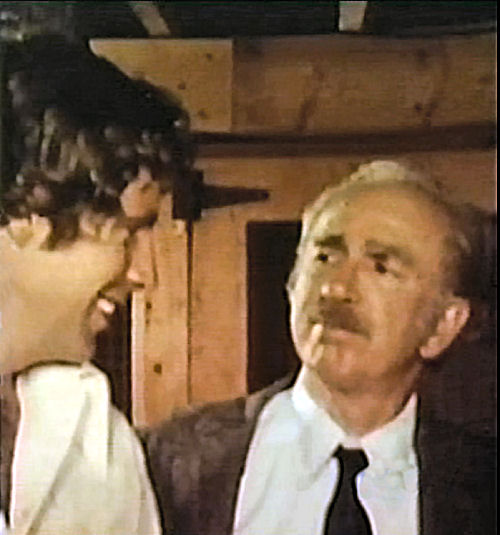
» "Walden Lost" (10/04/1971) [EO]
Written by Harry Kronman.
Directed by Richard Gilbert.
Wally and Carol Arden, a young couple attempting to experience a Waldenesque new life in a "garden of Eden," have instead been living hand-to-mouth in an old shed they've rented for the last year. When Dr. Locke goes to check on pregnant Carol and sees blood on Wally's shirt, he wonders what is going on. When Locke returns to the shed with Dan Palmer, the couple has fled into the surrounding countryside; Locke is positive Carol going into premature labor and must find them—and convince them to accept his help. However, once the baby is born, it needs an incubator and Locke must jury-rig one at a nearby stable. Wally: Ralph Endersby. Carol: Barbara Key. Art Asbury: Jim Barron. Mr. Marco: Edward McNamara.
» Notes: Wally's real name is Wallace Armstrong and Carol's maiden name was Barber. (There's also a "Carol Barber" in "Quiet Sunday," one of the typical continuity errors in the series.) They ran away from Detroit to get married because Carol was underage. • You'll notice Locke telling Wally why he moved to Dixon Mills, and, despite his strident reasons in the pilot, it seems he's not quite sure why he was doing it himself. • The brood mare farm appears to be a real, working farm. • Ralph Endersby was a popular child actor in Canada and played regular "Chub" on the series The Forest Rangers throughout the show's run.
Dr. Sellers: "See, I told you Dan Palmer had a heart."
Dr. Locke: "How come it didn't show up on the EKG?"
» "Death Is a Wanderer" (10/11/1971) [EO]
Written by Chester Krumholz and Wilton Schiller.
Directed by Richard Gilbert.
Bill Masters, Nurse Wynn's old flame, returns to Dixon Mills after years of adventures in foreign climes saying he is "home for good," but is stopped by Chief Palmer for driving under the influence. His erratic driving was actually due to morphine for pain for terminal Hodgekins Disease, and he demands that the doctors not let anyone know. He rekindles his romance with Wynn, but she guesses immediately that he is ill and confronts Locke and Sellers about it. In the meantime, Josh, an elderly friend Bill defended at the local gas station, has thwacked his abusive, belittling business partner over the head and then fled, thinking he's killed him. Palmer goes in pursuit and is accidentally shot for his pains; it's Bill who must fly the helicopter to rescue Palmer and talk Josh out of running away. Bill Masters: Ken James. Josh Michaelson: Murray Westgate. Fred: Steve Pernie. Joe Barnett: John Kerr.
» Notes:: The place Palmer is shot is called "Cranston Gully." • It is evident from Sellers' dialog that Mrs. Wynn's husband has not been deceased very long.
» It's "Spot Flora" Time: In the background of the dinner scenes in this episode you see a blonde woman helping to serve and clean up. She isn't credited and we don't learn her name; she has no lines. She reappears again in "The Wanderer" and "Quiet Sunday," and has lines in "The Wanderer." In neither episode is she credited, but we do learn her name is Flora. (It is possible Flora is in either or both "Gun Point" and "Marooned," but since they are missing in action there is no way to check.) I conclude that she is Dr. Sellers' housekeeper, since it can't be expected that Mrs. Wynn would clean house along with her nursing duties. It is possible that she's supposed to be Louise Wynn's sister, but we see her sister in the episode "Royal Treatment" and it's definitely not the same actress, she has red hair like Wynn and Dr. Sellers addresses her as "Mrs. Holgate." (Of course the continuity on this series was always a bit shaky, too.)
» Canadian Actor Watch: Murray Westgate played Mr. Brady the druggist in the Addie Mills story The House Without a Christmas Tree. Ken James appeared in, among other series, Kevin Sullivan's Wind at My Back.
» "The Cage" (11/01/1971)
Written and Directed by John Meredyth Lucas.
Dr. Sellers think his chronically ill patient, former miner Ty Watson, who has silicosis, is holding his own, but Dr. Locke arrives at the house hours later to find him dead. Guilty because he changed Ty's prescription only that morning, Sellers asks Locke to do an autopsy. Watson's spinster sister Edie, also chronically ill with Addison's disease, initially resists but is talked into it by her fiance. Despite the fact that Sellers asked for the autopsy, Palmer accuses Locke of trying to make Sellers look bad, and neighbors' remarks about her finally being free of her invalid brother make Edie upset. Then Palmer discovers Ty's oxygen tank was freshly painted green. What was in the tank Ty was breathing from, and who altered it? Herbie: Frank Perry. Edie Watson: Aileen Taylor Smith. Ty Watson: Ed McNamara. Mrs. Carpenter: Ellie Fuller.
» Notes: Ellie Fuller appears in the remainder of the series as Mrs. Rhodie, a humorous recurring character who habitually turns up at the clinic with a medical complaint but who pleads poverty when it comes time to pay, but she's credited as "Mrs. Carpenter" here. She's pretty much the Dixon Mills busybody. • The exterior of the Watson house in this episode appears to be a real home. • Locke notes that prednisone, a standard steroid used today for everything from arthritis to allergic reactions, is a new drug.
» "Bad Blood" (11/08/1971) [EO]
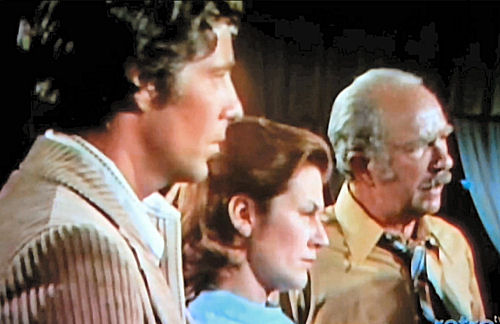 Written by Chester Krumholz and Wilton Schiller.
Written by Chester Krumholz and Wilton Schiller.
Directed by John Meredyth Lucas.
Dr. Locke is confined to bed after an explosive detonates in front of the clinic, but he's still confronted by a frustrated Ed Leonard, who is angered because Dr. Sellers' treatment for his daughter Elaine's diabetes isn't working and wants a second opinion. In the meantime Sellers tries a new drug on her, and the young woman goes berserk, attacks him, and then escapes in her father's car. Sellers must talk her off a cliff, and her father takes her away in a rage, saying that whatever Sellers gave her caused the abberation. She later turns up at the clinic, acting oddly even after she is given something to counteract the drug, where Chief Palmer confronts Ed about his freshly-purchased dynamite causing the explosion in front of the clinic. It turns out mental illness runs in the family. Ed Leonard: Walter Massey. Elaine Leonard: Bonnie Carol Case.
» Notes: Another early episode pushed back after others filmed later, as Locke is still considered "the new guy" and everyone in the waiting room wants to see Dr. Sellers.
» Canadian Actor Watch: Bonnie Carol Case turns up as a different character in "Quiet Sunday." Walter Massey later played elderly Dr. Stewart in the 1997 Cinar Lassie series.
» "Where are the Lucky Stars?" (11/15/1971)
Written by Fred Freiberger.
Directed by Gerald Mayer.
After being badly beaten in the woods, Josie Michaels, a wealthy girl known in Dixon Mills for being a habitual liar, accuses Henny Thompson, a quiet young man studying for a scholarship, of the crime. Her father Sam, who likes studious Henny, would rather Josie's assailant be Ned Gaines, the "bad boy" she is dating. Ned accuses Josie's father of hitting her, but he says he has only slapped her occasionally to stop her lying. When Henny shows up at the clinic, Josie has hysterics. The doctors examine Henny and believe the blood circulation to his brain may be impaired, causing blackouts, severe headaches, and violence; when Henny realizes he actually did attack Josie, he flees to the hills. An angry Ned and Dr. Locke race each other to find him first. Ned Gaines: Art Hindle. Henny Thompson: John Kastner. Josie Michaels: Jeannie Beker. Sam Michaels: Robert Goodier. Sarah Thompson: Jan Campbell. Miss Williams: Mary Barton.
• You can watch this episode online.
» "The Hero" (11/22/1971)
Written by Jim Carlson.
Directed by Gerald Mayer.
Dixon Mills lumberyard owner Charlie Cardwell is hurt after he saves a little boy from a burning school bus. When the doctors treat him they discover he has serious heart damage and has had previous heart surgery. Charlie refuses to give the doctors information about his past and Chief Palmer can't turn up any information about him until he checks military records. Charlie tells Dr. Sellers a sob story about an ex-wife and a disabled child, but Sellers senses he's hiding something else. When a man shows up at the lumberyard looking for a Carl Winters, owner of a thriving chain of 30 restaurants, he demands money for keeping quiet about the fact that "Carl" never divorced his wife; his resulting fistfight with Charlie ends up with Charlie suffering an aneurysm and needing immediate surgery. Charlie Cardwell: Gerald Parker. Kate Cardwell: Gwen Thomas. Dr. Wendland: Mo Margolese. Stranger (Jack): Jack Van Evera.
» Notes: I found a Cardwell Lumber still existent in the Kleinburg area, so evidently it was a real establishment. • The Dixon Mills newspaper that Jack shows Kate appears to be an Ontario newspaper with Charlie's photo and a headline pasted over another story.
» "Two Points of a Pitchfork" Part 1 (11/29/1971)
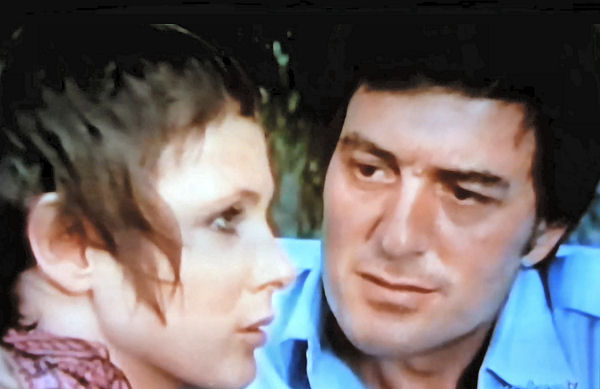 Written by Mort Forer and Marian Waldman, and Chester Krumholz and Wilton Schiller.
Written by Mort Forer and Marian Waldman, and Chester Krumholz and Wilton Schiller.
Directed by Gerald Mayer.
Dr. Locke and Dan Palmer are at the local carnival with their dates when a man collapses on a ride. Locke suspects typhoid fever. Palmer worries about his new girlfriend Ruth, who is terrified of illness, while the doctors search for the vector. Locke's prepared to quarantine the town, but Dr. Sellers warns him that a quarantine might destroy the local economy. Soon more people fall ill with typhoid, and from such disparate areas that Sellers suspects a carrier. Palmer has no choice but to put roadblocks around the town, raising the ire of the farmers who are due to take their crops to market. The local health officer finally decides declare an epidemic despite Sellers' and Wynn's protests; as if in answer, a brick is thrown through the clinic window. Jake Dawes: Sean Sullivan. Ruth Warner: Diana LeBlanc. Williston: Larry Reynolds. Bryce: Franz Russell. Ernie: Doug McGrath. Kid: Dominic Hogan.
» Notes: Again, an actual carnival is the opening setting, and the scene of Ruth's home appears to be someone's house.
» Canadian Actor Watch: Diana LeBlanc was everywhere in the 1970s on Canadian television. One of her well-known series roles was as Elizabeth, the mother in the half-hour Swiss Family Robinson series playing against actor Chris Wiggins.
» "Two Points of a Pitchfork" Part 2 (12/06/1971)
Written by Mort Forer and Marian Waldman, and Chester Krumholz and Wilton Schiller.
Directed by Gerald Mayer.
The townspeople react angrily when Dixon Mills is officially quarantined, and Chief Palmer grows more concerned when he thinks Ruth hasn't had her inoculation. Another carnival performer tips off Palmer that the hot dog vendor from the fair is a fugitive due to a violent crime and is not fleeing because he's a carrier, just before Palmer collapses from typhoid as well. Dr. Locke tries to persuade Ruth to visit him, but she demurs. Later the doctors find out that Ruth lied to Palmer about having her inoculation. While searching for the hot dog vendor, Palmer discovers Ruth is fleeing town, and she confesses she's the carrier. She is then escorted to a hospital with the health officer on the provisio that Palmer thinks she just left without saying goodbye. Jake Dawes: Sean Sullivan. Ruth Warner: Diana LeBlanc. Williston: Larry Reynolds. Bryce: Franz Russell. Ernie: Doug McGrath. Kid: Dominic Hogan.
» Notes: There's a noticeable blooper in this story—at the end of part 1, Williston the health inspector, says the quarantine is "two prongs of a pitchfork," but when the recap of the scene is shown before this episode begins, he says "two points of a pitchfork," as in the title. • In the tag at the end of this episode Sellers confesses to Palmer he lost his own love in his devotion to his profession; see "The Cortessa Rose.") • Clearly filmed during an actual carnival.
» "The Healer" (12/13/1971)
Story by Brad Radnitz. Teleplay by Chester Krumholz and Wilton Schiller.
Directed by John Meredyth Lucas.
Tom Bluefoot wants Dr. Sellers to deliver their child using modern methods, but his wife Mary wishes to have her grandfather, Jim Manyhorses, a Native American healer, do so in a traditional manner. Some of Sellers' other patients are consulting Jim as well, including Lucy Becker, who has stopped taking her arthritis medication. Tom fetches Dr. Locke when Mary begins her labor; he doesn't believe in Jim's herbal remedies and is rude and abusive to him. Mary, however, won't go into the clinic without Jim's permission, so when Jim runs off to die, Locke and Tom must find him. While searching Locke is bitten by a rattlesnake; it is one of Jim's remedies that saves his life. Now Locke must do a caesarian at the Bluefoot cabin to save the baby's life. Jim Manyhorses: Eric Clavering. Tom Bluefoot: Daniel Grigg. Mary Bluefoot: Susan Friedman. Lucy Becker: Mona O'Hearn.
» Notes: Palmer does not appear in this episode. • A flashback to the pilot episode is shown. • In an era when many ethnic roles were played by non-ethnic actors, Eric Clavering was cast quite a few times as a Native American character in series like The Forest Rangers, Hudson's Bay, and Adventures in Rainbow Country.
» "Cuckoo in the Nest" (01/03/1972)
Story by Helen French. Teleplay by Helen French, Chester Krumholz and Wilton Schiller.
Directed by Gerald Mayer.
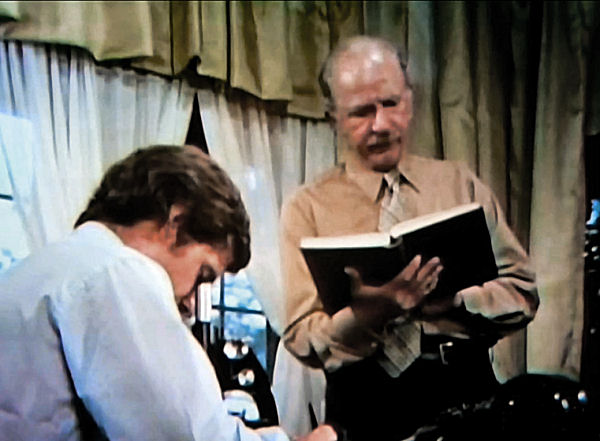 Annie Kinmond is evasive when the doctors ask what happened to her unconscious brother, especially when they discover bruises all over little Ralphy's body. Dr. Sellers takes Annie home and confronts her mother Marge about the abuse; later the girl tells an astonished Sellers that her father abuses Ralphy because he's blond, unlike the other children, a "cuckoo in the nest." The source of the abuse is proven when the boy panics the moment he sees his father. Dr. Locke tries to persuade Henry Kinmond that Ralphy can be genetically his child by explaining the concept of recessive genes, but Henry tells him that Marge already told him Ralphy isn't his child; he's convinced everyone laughs at him for being cuckolded. When Ralphy disappears from the clinic, Henry and Locke go search for him—and find him at the edge of a cliff. Marge Kinmond: Dawn Greenhalgh. Henry Kinmond: Frank Perry. Ralphy Kinmond: Ken Morris. Annie Kinmond: Kirsten Campbell.
Annie Kinmond is evasive when the doctors ask what happened to her unconscious brother, especially when they discover bruises all over little Ralphy's body. Dr. Sellers takes Annie home and confronts her mother Marge about the abuse; later the girl tells an astonished Sellers that her father abuses Ralphy because he's blond, unlike the other children, a "cuckoo in the nest." The source of the abuse is proven when the boy panics the moment he sees his father. Dr. Locke tries to persuade Henry Kinmond that Ralphy can be genetically his child by explaining the concept of recessive genes, but Henry tells him that Marge already told him Ralphy isn't his child; he's convinced everyone laughs at him for being cuckolded. When Ralphy disappears from the clinic, Henry and Locke go search for him—and find him at the edge of a cliff. Marge Kinmond: Dawn Greenhalgh. Henry Kinmond: Frank Perry. Ralphy Kinmond: Ken Morris. Annie Kinmond: Kirsten Campbell.
» Notes: Palmer does not appear in this episode. • It's very evident Dawn Greenhalgh is wearing a wig!
» Canadian Actor Watch: Dawn Greenhalgh was a regular on the 1970s horror soap Strange Paradise and is the mother of actress Megan Follows (Anne of Green Gables).
» "The Man Who Hunted Hunters" (01/10/1972)
Story by S. Rodge Olenicoff. Teleplay by Mort Forer and Marian Waldman.
Directed by George Gorman.
During hunting season, a man, dubbed "The Dixon Mills Dartman" by the local newspaper, is shooting hunters with tranquilizer darts and leaving them unconscious with tree-branch "antlers" stuck on their heads to protest the killing of deer. Dr. Sellers fears that a dart will kill someone because the dosage is set for animals, not humans, and tells Ryan, the newspaper editor, to stop publicizing the man. Ryan, hoping to get an exclusive story, searches the woods only to discover "Dartman" is Ben the local druggist, and promises to help him make his statement about needless slaughter. The next hunter arrives at the clinic nearly overdosed and is barely revived in time. Chief Palmer takes some of the antidote that Dr. Locke has created and sets himself up to be shot by the Dartman; the ploy works until he is shot with a second dart. While Dr. Locke heads out to rescue him, Ben asks Ryan to help him with one last scheme to get attention: he's going walking in the forest with antlers on. Ben Parsell: Sydney Brown. Ryan: Robin Ward.
» Notes: Ben and Sellers were old friends who as boys used to feed the deer who came to the edge of town. • This episode had probably the biggest "fail" in the history of humorous taglines: after what happened to Ben, the joke at the end is really in bad taste.
» "Too Many Candles" (01/17/1972)
Written by Chester Krumholz and Wilton Schiller.
Directed by Gerald Mayer.
Farmer Collie Warren is furious when his friends throw him a surprise party when he turns 40 and punches out one of the guests, his oldest friend, and breaks his jaw. When Chief Palmer requests he pay Ed Moffat's medical bills, Collie attacks him as well. His wife Karen says Collie is afraid of growing old and asks Dr. Locke to speak to him, but Collie refuses to listen to either doctor and storms out; Locke then attempts to ferret out his symptoms by his actions, including questioning the woman he thinks is Collie's mistress, Mary Brown. It turns out he is paying off her mortgage, not sleeping with her. Collie's bitter partner reveals Collie was becoming careless with his work and skiving off. The next thing both men know, they meet Collie giving away gifts in a horse-drawn sleigh even though it's only February 9. Everyone assumes his personality shifts are because he's turned forty, but Locke finally discovers he's been using pesticides without taking precautions—he has heavy metal poisoning. Collie: Anthony Palmer. Karen Warren: Gwen Thomas. Jake Dawes: Sean Sullivan. Mary Brown: Vivian Reis.
» Notes: Both Collie's and Jake's properties appear to be actual farms. • Now, if you knew a friend was very sensitive about turning a certain age, would you still throw him a surprise party and then tease him about how old he was? I found this terribly insensitive. • I love that Locke does a "differential diagnosis" board 33 years before House, MD.
» "Child of Silence" (01/24/1972)
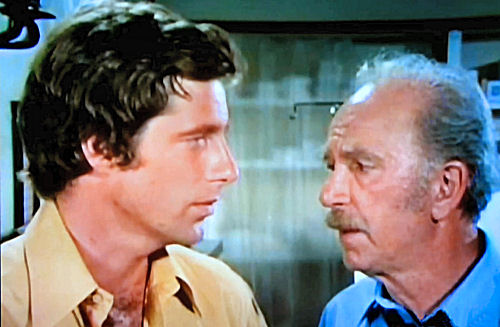 Written by Oliver Crawford.
Written by Oliver Crawford.
Directed by Gerald Mayer.
Bert Grant plans one last snowmobile ride with his mute son Jeff before leaving Dixon Mills for good; the boy, disappointed because his father gained custody of him that morning in divorce court, climbs a water tower and refuses to come down. Dr. Locke climbs up in hopes he can talk the child down, then, unsuccessful, accompanies Palmer to fetch the child's mother, only to find she's tried to commit suicide by taking barbiturates with liquor. Despite Dr. Sellers' efforts to persuade him, Jeff stays put on the tower, and a strong, freezing snowstorm is due in hours. Once revived, a fearful Stella Grant allows herself to be taken to the tower, where she tensely watches Sellers and her son descend after the boy sees her arrive. She explains to Jeff that no matter where he lives, she will always love him. Jeff Grant: Christopher Pellett. Bert Grant: George Sperdakos. Stella Grant: Catherine Begin.
» Notes: According to Wikiwand, this episode was filmed at an old water tower in Markham, Ontario. • Mrs. Wynn does not appear in this episode. • Christopher Pellett appeared in an episode of The Forest Rangers as a deaf boy. Is it possible he really was mute as well as deaf? I could not find any information about him online. • The beginning of the poem Sellers quotes for Jeff is "Dream-Pedlary" by Thomas Lovell Beddoes.
If there were dreams to sell, What would you buy? Some cost a passing bell; Some a light sigh, That shakes from Life's fresh crown Only a rose-leaf down. If there were dreams to sell, Merry and sad to tell, And the crier rang the bell, What would you buy? A cottage lone and still, With bowers nigh, Shadowy, my woes to still, Until I die. Such pearl from Life's fresh crown Fain would I shake me down. Were dreams to have at will, This best would heal my ill, This would I buy.Full poem here.
• You can view this episode online.
» "Dark Future" (01/31/1972)
Written by Jim Carlson.
Directed by John Meredyth Lucas.
Dave McMillan has returned to Dixon Mills—and his fiancee May—after serving eighteen months in prison and is welcomed home warmly by Chief Palmer, Norse Wynn, and Drs. Locke and Sellers. Sellers is eager to set Dave back on track in his interrupted medical studies, but the young man appears angry, telling them he still feels guilty about having accidentally killed May's father while driving drunk. They don't know that Dave is having difficulty with his vision. When he does see May again, he rebuffs her advances, and also later dismisses Sellers' medical plans for him. But while skiing with May he runs directly into a tractor. The diagnosis: incurable degenerative retinitis. Dave tells May he doesn't want her anymore—but Sellers throws a chair in his plan (literally). Dave: Edward Resmini. May: Michéle Chicoine. Mrs. Rhodie: Emmie Fuller. Charlie Bitterman: Al Bernardo.
» Notes: Evelyn, one of Locke's patients, is plainly flirting with him during her examination! • According to Wikiwand, this was filmed at "the old ski hill" on Twyn Rivers Road in Pickering, Ontario. • Perhaps Al Bernardo's character in "Max" is also Charlie Bitterman?
» "The Cortessa Rose" (02/07/1972)
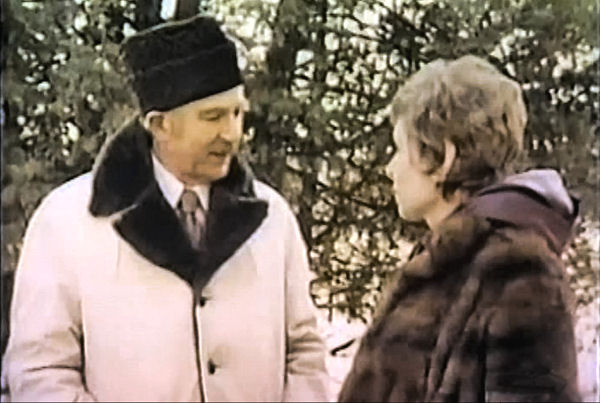 Written by John Meredyth Lucas
Written by John Meredyth Lucas
Directed by Gerald Mayer
Dr. Sellers is following up on a patient at Harkness Hospital when he runs into his old flame Ellen Hewitt. After a disastrous marriage, she apprenticed to a fashion designer, then inherited his business and his line of clothes, shoes, and accessories: the Cortessa brand. He brings Ellen back to Dixon Mills, and Nurse Wynn and Dr. Locke are charmed by their sweet renewed romance. Upon coming into the house, Ellen slips on the ice, and while checking out the x-ray of her ankle, Locke discovers she has osteosarcoma. Wynn insists he tell her immediately, but Locke doesn't think he knows her well enough to do so. During a snowy walk, Sellers expresses his regrets that they did not pursue their romance, and Ellen says she's there for good. When Locke "breaks the news" to Ellen he finds she already knows, and she doesn't want Sellers told; nor does she want to try any further treatment. While Sellers confronts Locke about meddling in his love life, Ellen has decided that Locke is right; survival is important to her and she will try treatment in Switzerland after all. She leaves, promising to return to Sellers. Ellen: Stevie Wise. Dr. Lusk: Tom Harvey. Doctor: Hugh Fenton. Mrs. Rhodie: Emmy Fuller.
» Notes: Palmer does not appear in this episode. • Sellers' home actually belongs to the town of Dixon Mills. He can live there so long as he practices medicine in the town. • This is obviously the romance Sellers alludes to when commiserating with Palmer in "Two Points of a Pitchfork." • The episode title comes from Sellers' roses; he is breeding a new one he intends to call "The Cortessa rose." • Mrs. Wynn comments that Ellen's bones look "like lacework." John Meredyth Lucas' mother suffered from the same form of cancer and this is how he described it in his book. • This episode really should have been a two-parter, with a subplot added (maybe the birth Sellers and Ellen attend goes wrong and she is able to assist him in a followup visit). Ellen is adamant through the entire episode that she will not undergo any further cancer treatment, but it takes just one lecture from Locke to change her mind.
» "The Meddler" (02/14/1972)
Written by Chester Krumholz and Wilton Schiller
Directed by John Meredyth Lucas
Young Amy, a pre-med student, meets Paul, a ski bum traveling in a motor home with four other young people, in the Dixon Mills park. She normally has long therapy sessions each day and walks with crutches, but she overcomes her constant pain due to Paul's interest and abandons them to stroll with him. Dr. Sellers is worried when she brings Paul to the clinic, but she assures Sellers that he will be gone in a few days and during that short time she wants to feel as if she is a whole person and not handicapped. Dr. Locke is angered that Amy is throwing away years of therapy and threatens to tell Paul. Amy, chafing at her restrictions, has just agreed to go with Paul and his friends on their ski odyssey, when Paul falls and sprains his ankle. Locke tries to talk Amy out of leaving, and Paul out of taking her away; the latter realizes he must leave Amy behind for her own good. But all ends well: surgery has finally been arranged for her! Amy: Tedde Moore. Paul: Dominique Briand. Lou: Alan Jordan. Bill (brown jacket): Jim Henshaw. Mrs. Rhodie: Emmy Fuller.
» Notes: Palmer does not appear in this episode. • Notice the Winnebago the skiers are traveling in; it also appears in "Two Points of a Pitchfork." It's probably the RV they brought on the set, finally, to act as a dressing room.
» Canadian Actor Watch: Tedde Moore played Ralphie's schoolteacher in the now classic film A Christmas Story.
» "Marooned" (02/28/1972)
Dr. Locke and Dan Palmer search for a 19-year-old girl who has wandered off into desolate snow country in an apparent suicide attempt. They rescue her, but all three get caught in an avalanche and must struggle to survive and cooperate until help arrives. Doreen: Mary Pirie. First Searcher: Andrew Arnold. Pilot: Jack C. Corden.
» Canadian Actor Watch: Jack Corden played Jean Paul Desmond's sinister cousin Lazlo in the Canadian 1970s horror-soap Strange Paradise, which featured zombies before zombies were "cool."
As Locke and Palmer shiver under blankets and drink hot coffee after being rescued, Dr. Sellers keeps ragging on them:
Sellers: "My two friends!" (to Locke) "How are you, sir?"
Locke: "How's an ice cube?"
Sellers (to Palmer): "And you?"
Palmer: "Ask me again when the spring thaw comes."
Sellers: "I think I'd better turn down the heat."
Locke: "Over my frozen body."Palmer: "What are you drinking?"
Sellers (offers glass): "Iced tea. Want some?" (when met with malevolent looks) "I think I hear the doorbell ringing."
» "The Wanderer" (03/05/1972)
Written by Chester Krumholz and Wilton Schiller.
Directed by John Meredyth Lucas.
Dr. Locke examines an unconscious teenage boy, Dale, brought into the clinic by Scott, a man who claims to be his father, but who tried to kill him minutes earlier. Once awake, the boy tricks his pursuer, who flees in a wild goose chase in Locke's car after holding off the doctor and Dan Palmer with a gun. Following a clue from the doctors' housekeeper, Dale visits elderly, blind George Ossman who worked with Lydia Morgan, a woman supposedly killed by Dale's now-imprisoned father. Dale knows his father was wrongly convicted and that Lydia is still alive; he's tracking her to clear his father. But she has refused to make herself known because she knows members of a crime syndicate will kill her. Ossman requests that Dale bring him the notebook he is secretly carrying, a compilation of names and notes made by a reporter named Edward Zane for an exposé of "ordinary people" who work with organized crime, but it is only to lure him to his death at Scott's hands. With Locke and Palmer's help, Scott is captured; understanding that Dale is on some type of "mission," Locke allows the boy escape. Dale Somerfield: Jim Henshaw. Scott: Arch McDonell. Arthur Somerfield: John Gardiner. George Ossman: T.G. Fenwick. Lydia Morgan: Jean Templeton.
» It's "Spot Flora" Time: Flora appears, and has several lines, one telling Locke that Dr. Sellers is on his way back, and she also speaks to Dale. The actress still not credited.
» Notes: Dr. Sellers and Mrs. Wynn do not appear in this episode. • Like Flora, also uncredited is the young woman who takes care of the dog (she is only shot from the side, so it's hard to tell, but her voice sounds like Michéle Chicoine, who played May in "Dark Future"). • This is an odd fish of an episode that looks as if it is either a pilot for an unproduced series or a dry run for Police Surgeon. Dale is not only searching for Lydia Morgan, but he is a fugitive from justice because it is suspected that he killed Edward Zane. He is traveling with Zane's dog, a Briard, who was injured in the attack upon Zane. The reporter's notebook which he took from Zane's office is titled "Casebook of Lydia," which would have made an interesting series title. However, Locke and Palmer seem tossed into the plot. If this was an unsold pilot, who exactly was it aimed at? It has elements of The Fugitive, yet it involves a teenage boy and a dog. He's involved with crime syndicates, men are trying to kill him, so it has adult themes, but it's a kid and a dog. I know the original Littlest Hobo was billed and filmed as "an adult adventure series," but this one is just weird.
» "Royal Treatment" (03/12/1972) [EO]
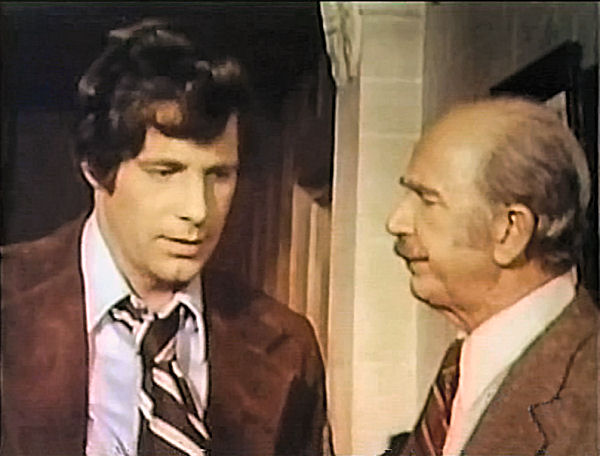 Written by Chester Krumholz and Wilton Schiller.
Written by Chester Krumholz and Wilton Schiller.
Directed by George Gorman.
Dr. Sellers gets an urgent call from Dr. Locke's old stomping ground, Carstairs General Hospital: Joseph Carter, a former patient of Dr. Locke, is near death and demanding he be attended by Locke. Chief Palmer warns Sellers and Nurse Wynn that once Locke goes back to the city he won't want to return; they both fear the same thing. Following Locke's departure, the Hart family arrives at the clinic, the children feverish, vomiting, and hallucinating, their parents soon sicken as well. Sellers is urged to call Locke, but he stubbornly refuses to admit he can't cope. At Carstairs, surgery must be performed when they can't identify the mass near Joe Carter's pancreas, and the doctors promise all sorts of things to persuade Locke to stay. Sellers finally realizes that the Harts have toadstool poisoning (little Della picked them in the woods and tossed them in the stew), and Locke returns to Dixon Mills after he gently breaks the news to Joe that he is dying. Dr. Fred Bonner: Tom Harvey. Joe Carter: Ed McGibbon. May Carter: Barbara Franklin. Mel Hart: Jay Reynolds. Connie Hart: Pixie Bigelow. Della Hart: Carole Woodward.
» Notes: While this is listed as being aired later in the series; it's an early episode, with the staff still afraid Locke will not come back. Bonner even offers Locke his own wing in the hospital, with handpicked doctors to serve under him! He also says they expected Locke back within a month, which means he's been in Dixon Mills at least that long; since he arrived in winter and it's now clearly sunny and warm, it's been at least several months. • This is the episode in which Mrs. Wynn's sister, whom Sellers calls "Mrs. Holgate" appears, but she's not credited. It is not the same actress who plays Flora.
» "Crash" (03/19/1972)
Written by Arthur Dales
Directed by John Meredyth Lucas
A minister dictating a sermon into a tape recorder while driving collides with Larry Frost, a worried and distracted truck driver, and his sullen daughter on a remote woodland road. The minister's back is broken and he sees the accident as a test of his faith when Chief Palmer airlifts him to Harkness Medical Center. The truck, which holds liquid oxygen, has rolled over, trapping Frost underneath; the tank, cracked, begins to leak. Nate, the local forester who called in the accident, fears that if the truck explodes he will lose his cash crop, the surrounding trees. He flees, leaving Drs. Sellers and Locke to try get the driver from under the truck. Complication: the pressure of the truck is keeping the driver from bleeding to death. Nate returns, helping them free Larry Frost with a carefully timed operation with a bulldozer. Nate: Jon Granik. Reverend Menzies: Dan McDonald. Lucy Frost: Barbara Kyle. Larry Frost: Ron Hartman.
» Notes: Mrs. Wynn does not appear in this episode. • According to John Meredyth Lucas, this was the final episode filmed. The rain apparently made the shoot a nightmare of mud. • This may be Nate Bascom, who was mentioned in the pilot episode.
» Canadian Actor Watch: Jon Granik and Dan McDonald were both regulars on the 1970s horror-soap Strange Paradise.
» "Death Holds the Scales" (03/26/1972) [EO]
Written by Chester Krumholz and Wilton Schiller.
Directed by Richard Gilbert.
Chief Palmer reluctantly flies Dr. Locke to the remote Adams home, where David Adams is suffering chest pain. Adams passes out after ranting angrily at his wife for calling help. Locke removes fluid accumulating on his heart, but soon he is on the telephone asking Dr. Sellers for more treatment ideas while they wait for Palmer to return; the chief's hunting down a murderer who escaped maximum security. Locke tells the man's wife that he thinks Adams has had coronary problems for some time, which is why he quit his job, a bone of contention between them. Palmer finally returns, but he has been shot by the convict he was trailing, and must receive a transfusion from Helen Adams. Bullet removed, Palmer is finally conscious enough to fly them back. But once Adams is safe, Locke must chase after Palmer, who's still pursuing his quarry. Helen Adams: Terry Tweed. David Adams: Richard Alden. Killer (Peter O'Rourke): Jerry Huckstep.
» Notes: Another early episode shown later in the series; Helen remarks that Locke doesn't have Sellers' bedside manner and Palmer jibes Locke that he's just collecting another story "about the natives" for his friends back in the city. • The Kingsbridge dispatcher's call sign is 8729R and his name is Charlie Fisher. The Dixon Mills call sign is 2457B. • The exterior shots, at least, are of an actual home.
» "The Perfect Specimen" (04/02/1972) [EO]
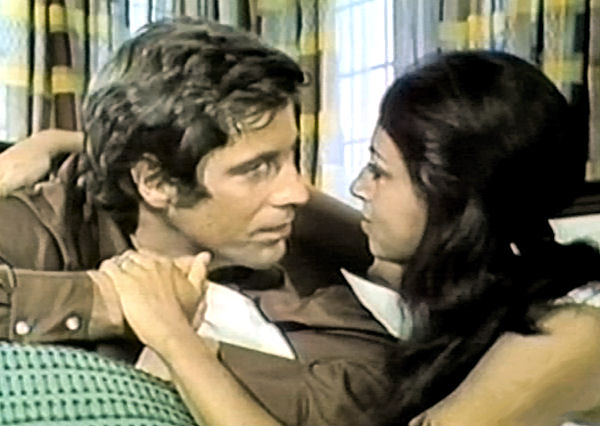 Written by Chester Krumholz and Wilton Schiller.
Written by Chester Krumholz and Wilton Schiller.
Directed by Richard Gilbert.
Jean Jordan, in terrible pain, calls from far out of town just as Dr. Locke's old girlfriend Andrea arrives at the clinic; they find Jean unconscious at the side of the road. At the clinic Jean denies that the pain and fainting are anything to worry about; when Lou Jordan comes home he swears she's never been sick in her life and is furious that she was given a sedative. Locke knows that Jean's undiagnosed ulcer will kill her if not treated, while Lou rants to Chief Palmer, wondering why Locke came out to "the sticks" to practice, and starts to badmouth him to others; soon patients are refusing to see Locke. Dr. Sellers says this reflects badly upon his ability to make decisions and plans to tell Lou that if something happens to Jean, it's his fault. He no sooner attempts this than Jean is brought to the clinic hemorrhaging. A rampaging Lou, fearful she will die, must be restrained while Locke, Sellers, Andrea, and Wynn do emergency surgery. Jean must be the one to tell him she really was in terrible pain; that she was afraid to tell him because she always wanted to be perfect for him, and that she knows she will need further surgery and treatment. Andrea, unsuccessful at persuading Locke to return with her, leaves. Lou Jordan: Mike Kirby. Jean Jordan: Marrie Mumford. Andrea Howard: Toby Tarnow. Sarah: Bess Amos. Joe Barnett: John Kerr.
» Notes: Yet another early episode, with an elderly patient wary of a procedure Locke is to perform on her; it's obvious Locke's intensity has not yet endeared him to many of the patients. This may be the second or third episode of the series as intended.
» "Quiet Sunday" (04/09/1972)
Written by Chester Krumholz and Wilton Schiller
Directed by Gerald Mayer
Dr. Locke is awakened early Sunday morning after being on call all night to find a waiting room so crammed with so many patients that Nurse Wynn's sister has been called in: the crowd includes Jake Shackleton, who's feeling so terrible that Mrs. Wynn has put him to bed; Lea, a woman Chief Palmer arrested on suspicion of the murder of her boyfriend; Mr. Lomax, a self-important man with an injured hand; a youth with a broken arm; and a bride-to-be whose father wants Locke to tell her about the facts of life. Sadly, Jake's heart is giving out and nothing can be done about it. While Locke and Nurse Wynn examine the young prisoner, who apparently murdered her boyfriend, a little boy is brought in, choking on a piece of cork. During his treatment, the girl sneaks a scalpel, and later holds Wynn hostage; luckily Palmer shows up in time to tell her the boyfriend isn't dead. Outside in a car, the bride-to-be watches as Locke delivers a baby; she assures him she "knows what's going on." As one life begins, Jake's is coming to an end, and he asks Locke if he can call him by his first name. He dies as Locke is telling him what a good friend he's been. And Mr. Lomax, who's whined and complained the entire afternoon, is left for last. Jake: Sean Sullivan. Carol Barber: Charlotte Blunt. Dorothy Loomis: Julie Rekai. Joe Loomis: Steve Weston. Lea: Bonnie-Carol Case. Mr. Lomax: Don McGill.
» It's "Spot Flora" Time: Flora wakes up Dr. Locke and also offers him some sandwiches. She still doesn't appear in the credits. Mrs. Wynn's sister is stated to have been sent for to help, so this further muddies the water on whether Flora and Mrs. Holgate are supposed to be the same person.
» Credit Curiosities: For some reason Sean Sullivan, who has played this whole season as the character "Jake" (identified as "Jake Dawes" in "Too Many Candles") is called "Jake Shackleton" in this episode, and then credited as "Ben." I think the continuity editor was napping that day. I'm assuming "Joe" is Mr. Loomis, husband of Dorothy, who gives birth, and not "Jason" (the grandfather with the choking child) misidentified.
» Notes: This episode has my favorite Locke tag: Locke is heading back to bed when a man rushes into the clinic. His mare is having trouble foaling and the vet is out of town. Locke wearily shrugs and says "Why not?") • Notice that when Flora knocks at Locke's door as the episode opens, the voice you hear saying "Dr. Locke?" is Nuala FitzGerald's. Once Flora's in the room, however, the voice is the actress' own.
**I have found that the series has made more sense chronologically since I put them in a kind of order on my DVDs. The initial episodes are the pilot and the episodes with the extended opening included in the title sequences ("Perfect Specimen," "Walden Lost," "Royal Treatment," "Death Holds the Scales," "Death is a Wanderer," "Max," "Bad Blood" with the truncated opening and finally "The Cage." I pretty much then followed on with all the episodes that take place during a warmer time of year (and have the original cars used by Locke and Sellers): "Where are the Lucky Stars," "The Hero," "Two Points of a Pitchfork," "The Healer," "Cuckoo in the Nest," and "Crash," ending with "Man Who Hunted Hunters" as I figured hunting took place in the fall, and then finally all the winter episodes (in which both the vehicles driven by Sellers and Locke have changed): "Too Many Candles," "Child of Silence," "Dark Future," "Cortessa Rose," "The Meddler," "Quiet Sunday," with "The Wanderer" last. ("Marooned" would also be a later episode as it took place in winter. "Gun Point"? No clue.) With the extended opening sequence episodes watched at the beginning of the series you can see how Locke progressed in getting used to Dixon Mills and vice versa.
My dream "second season" for this series:
I really do think that with a better budget, some care chosen in filming, choice of actors, etc. this could have been a well-done series with a small but solid following that lasted a few seasons. I've had fun imagining some episods for a second season.
- This is a farming community, so a story about an accident with farm machinery would have been a natural. Could have been a two-part story, the doctors trying to save a farmer's limb. Obstacles: a storm which kept the helicopter from Harkness (Hargrove...whatever) from arriving, a blocked road.
- Diseases: a rabies outbreak, or anthrax. (More jeopardy: one of the people bitten by the rabid animal was not a cast regular, so there was a chance that they would die; another victim could be saved. Or perhaps this could be a character from a previous episode, like Carrie Morgan or Henry Kinmond.)
- I would have liked to have see Kinmond redeem himself. Maybe he stood up for a stranger in town who people might be suspicious of.
- County fair story.
- Since Ben Parsell was carted off to jail, an appearance by the new pharmacist. Or one where we see the vet Simon substitutes for. Perhaps he is a young, carefree Tristan Farnon type, exactly Simon's opposite, which grates against Simon's nerves.
- A story about Dan that doesn't end tragically. Not to mention a story about Wynn that doesn't end tragically.
- Simon's family (or anybody's family, for that matter).
- Another two part idea, perfect for the 70s: a factory proposes to build in Dixon Mills. Looks like a good deal, the town will really benefit, but they found out someone (maybe Mr. Lomax) is hiding that it will pollute the area and destroy the beauty of a park or outlook. They must stop the factory from being built/land for factory being sold.
- Weather problems: Heat wave. Conversely, flood or blizzard.
- An elderly resident with beginnings of dementia disappeared from the local nursing home. He or she could have been an old friend of Andrew's, leading him to question his own mortality. Or this could have been a grandparent of Dan Palmer or Nurse Wynn. (Dan's French grandmother? This explains his fluency in French.)
- Lost camper or child.
- Another story with Ryan the newspaper editor.
- Mrs. Wynn's sister in a speaking role.
- A nurse is hired from the city (maybe Mrs. Wynn is injured). She can't hack it in some way or hates the country and alienates everyone.
- Simon on a weekend fishing trip. Turns into a busman's holiday. (This could have been with Dan for maximum argument.)
- Simon heading home from a distant housecall, involved in a car accident when a deer or other animal leaps into the road. Survival story.
- Another story—at least; I'd prefer more—that involved the Native American community. Perhaps a reverse of "The Healer," where Jim Manyhorses had to convince a friend to see a doctor.
- A story involving the black couple who get a few lines in "Two Points of a Pitchfork" and turn up occasionally in the crowd, or Henry, Dan's police colleague. Surely they aren't the only people of color in Dixon Mills?
- A story so we could figure out who Flora was!
Links
The TV Guide article that started this web page madness.
(copyright 1972 TV Guide)
♫ ♫ Full Version of the Opening Theme (with helicopter) ♫ ♫
♫ ♫ Credit Sequence ♫ ♫
CTV Episode Guide (This as well as two other episode guides no longer online, list an episode called "September." I think this was an alternate title for "The Cortessa Rose" and wasn't anything that actually aired.
Complete Directory to Prime-Time and Cable TV Shows Entry (Google Books preview)
Washington Post TV magazine
(sorry about quality; scan from photocopy)
Article about Len Birman and his wife, from May 12, 1958!
Vintage Newspaper Ads and one magazine.
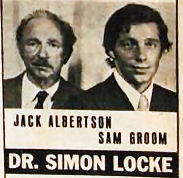
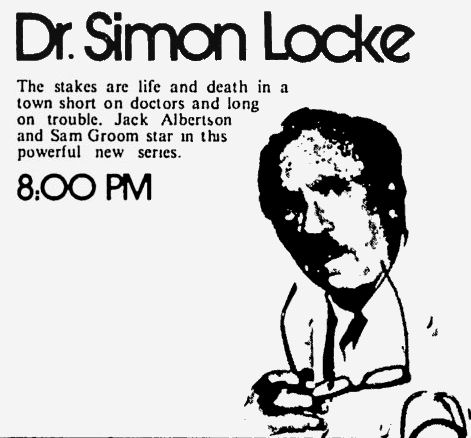
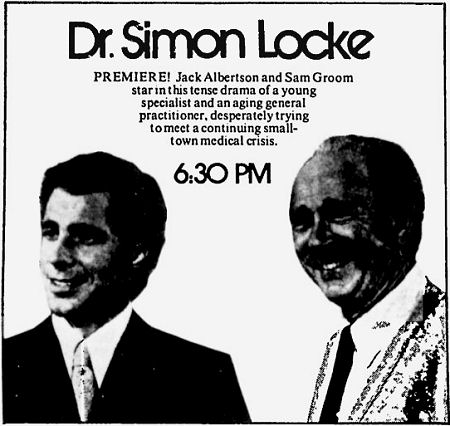
I particularly love this ad because I used to watch Locke
on WTEV (now WLNE) Channel 6 from New Bedford, MA
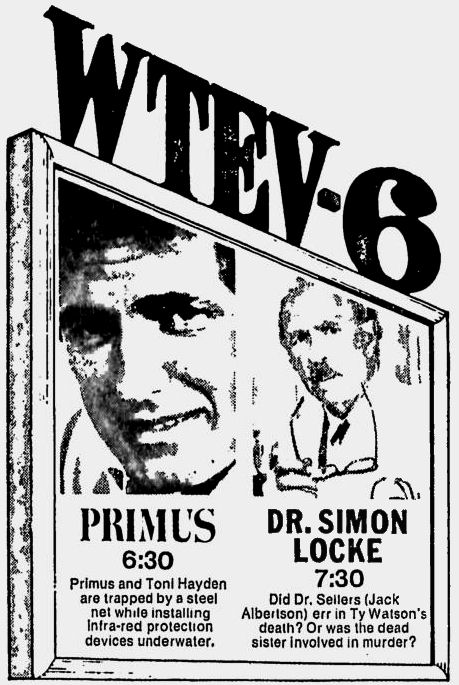
This is a Japanese magazine previewing 1970s American television.
Of all the series profiled in the magazine, they chose Doctor Simon Locke for the cover.
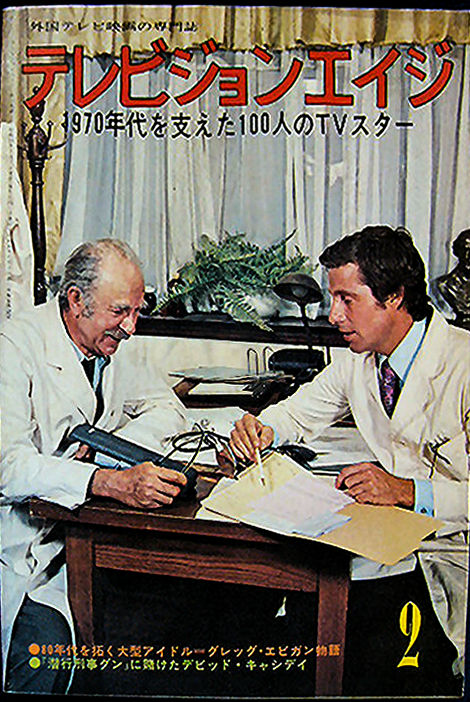
Star Photographs
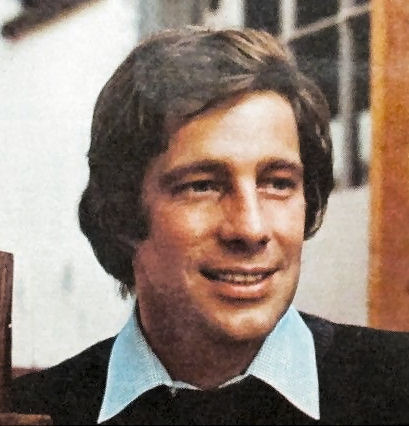
Sam Groom (probably from Another World)
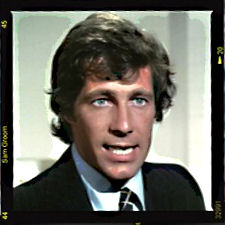
Sam Groom (publicity still)
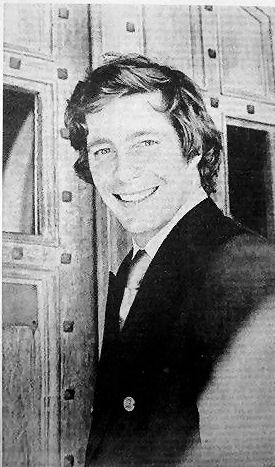
Sam Groom (publicity still)
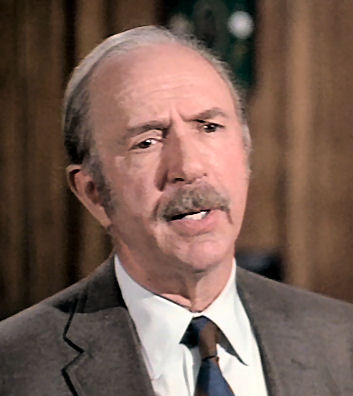
Jack Albertson (McMillan and Wife pilot from 1972)
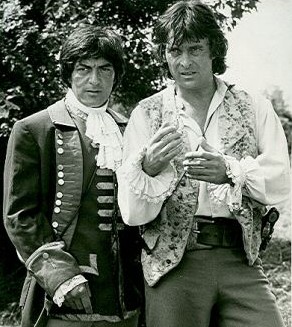
Len Birman (on left; from the series Young Dan'l Boone)
The man on the right (Birman's left) is Jeremy Brett!
Four Lone Publicity Articles
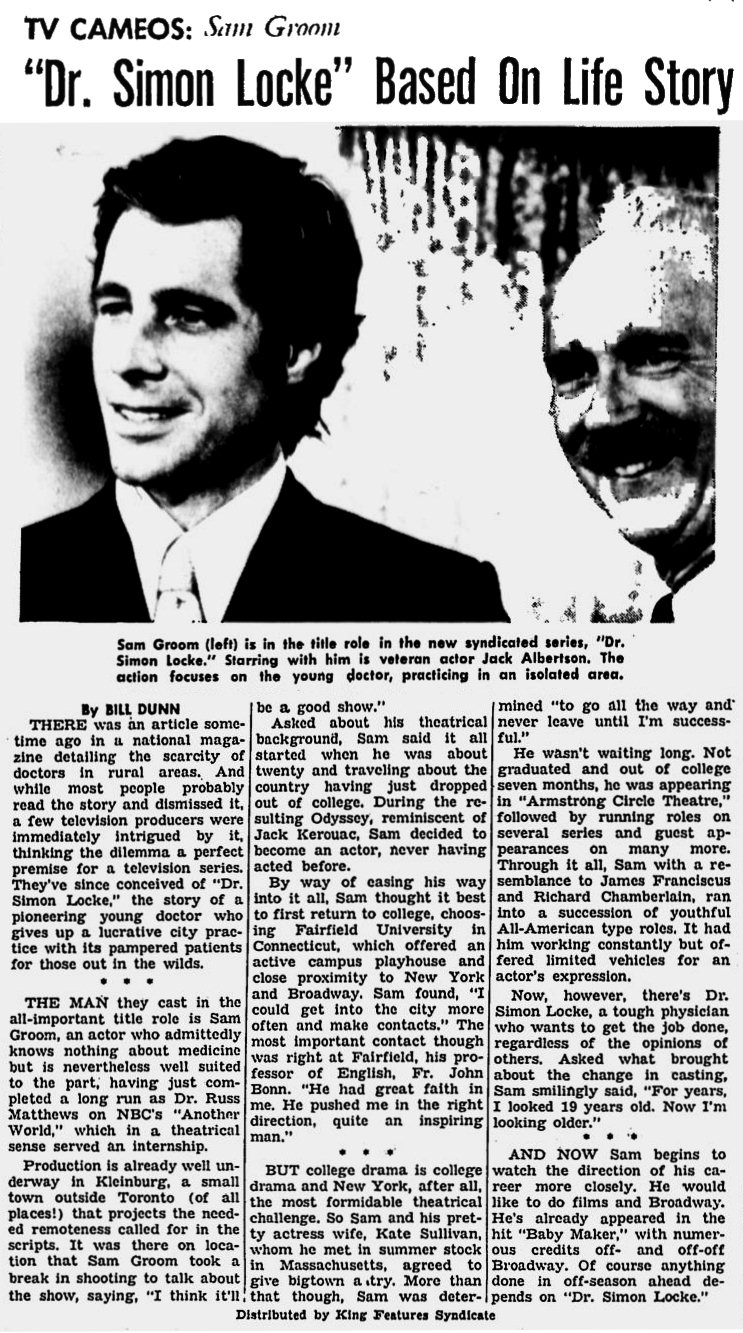
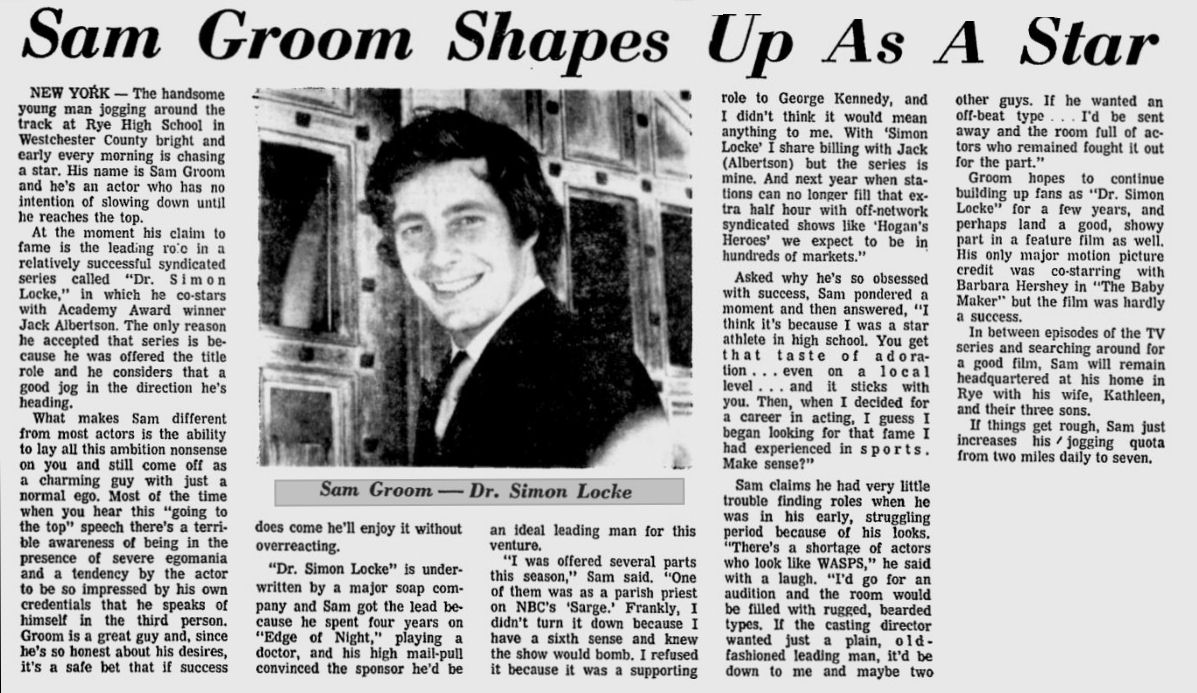
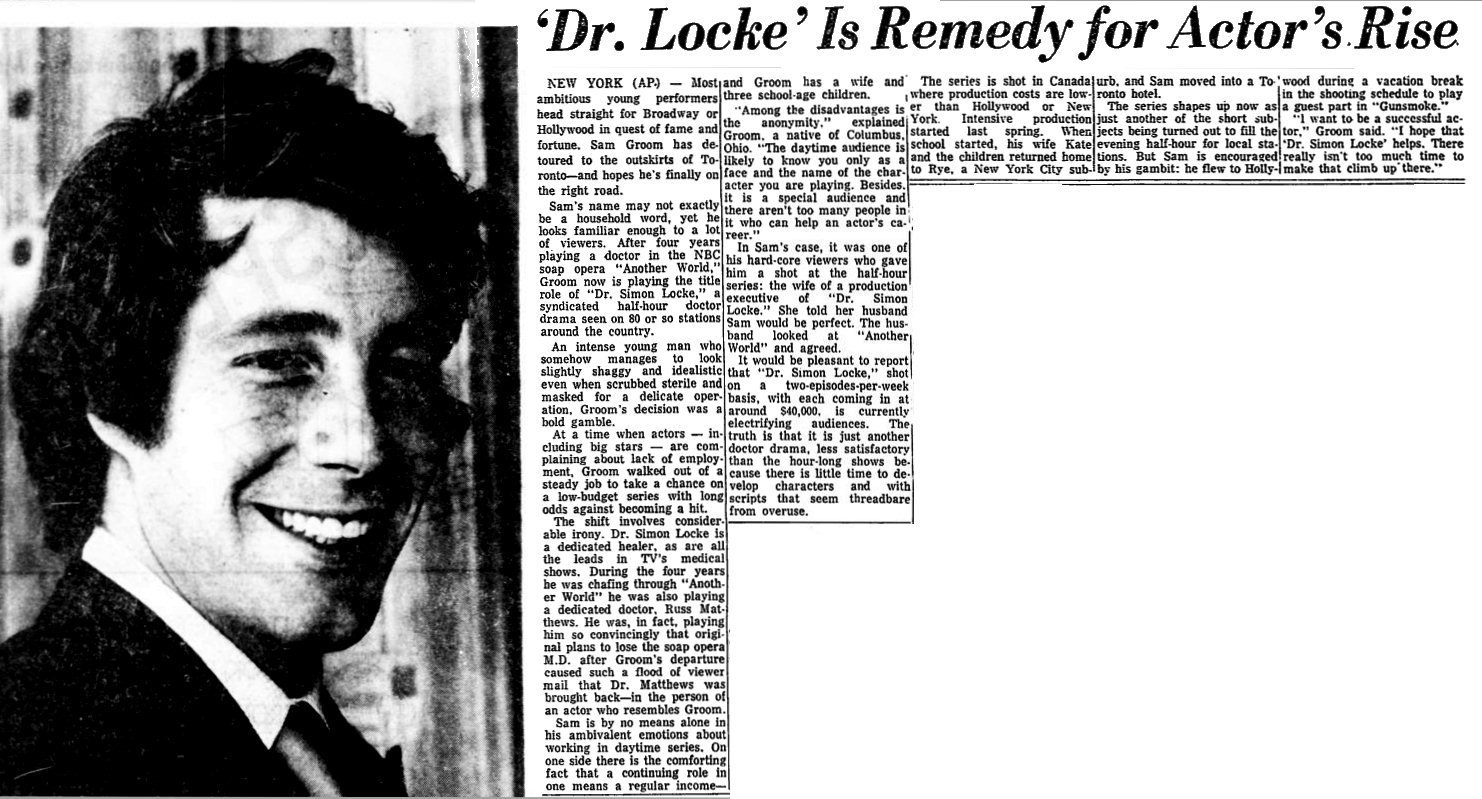
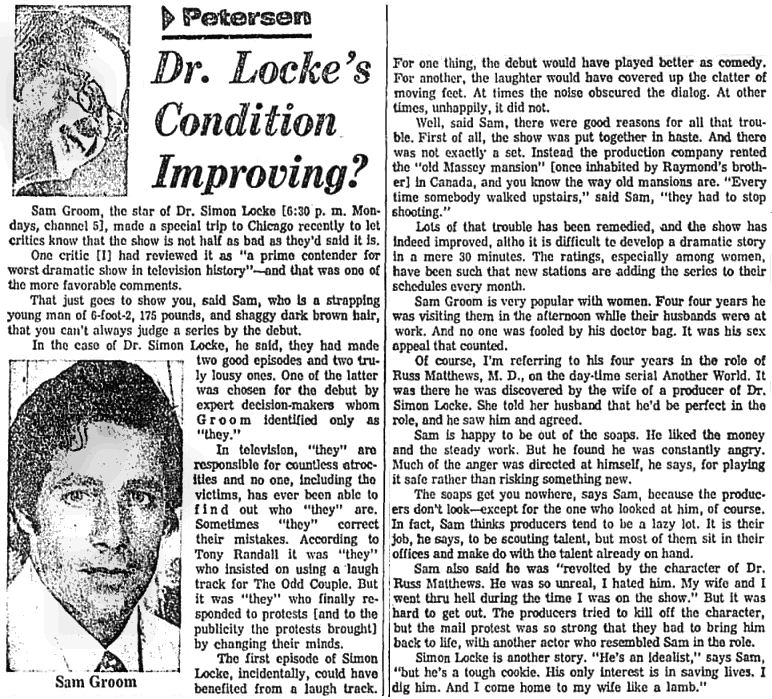
Screen Captures
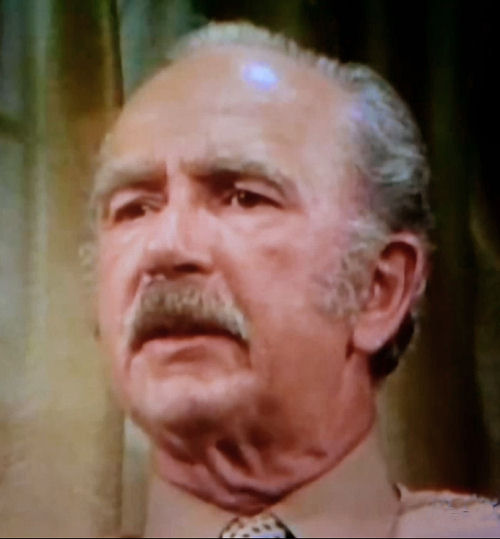
Dr. Sellers concerned.
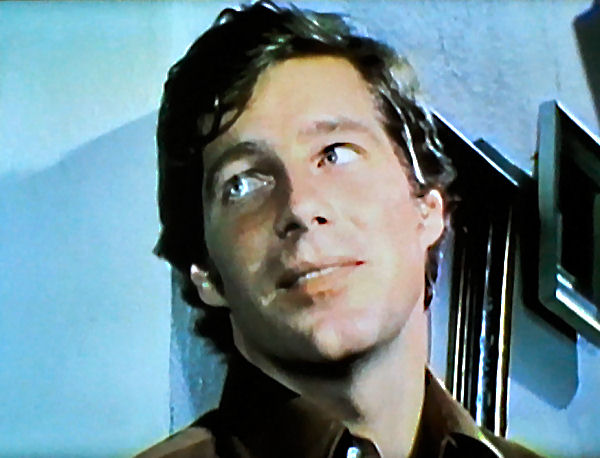
Dr. Locke looking rather appealing.
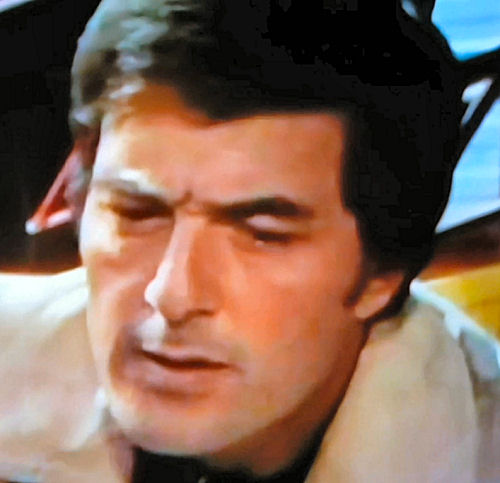
Chief Palmer learns some bad news.
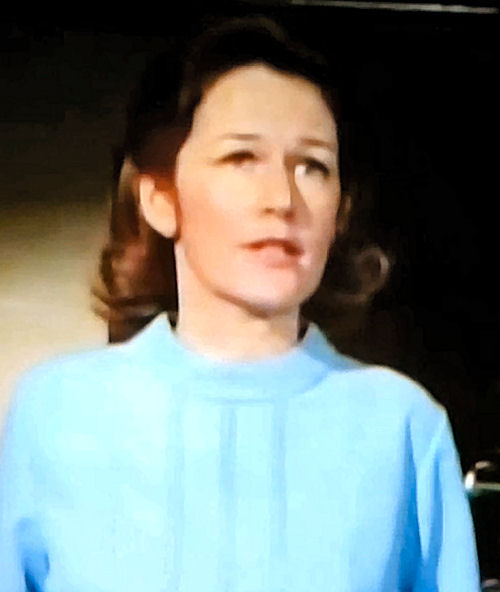
Nurse Wynn, a good person to at your side during a crisis.
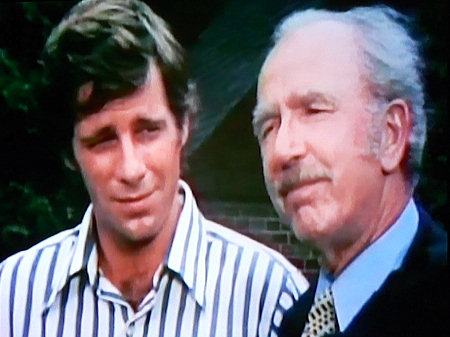
Simon and Andrew see a patient off.
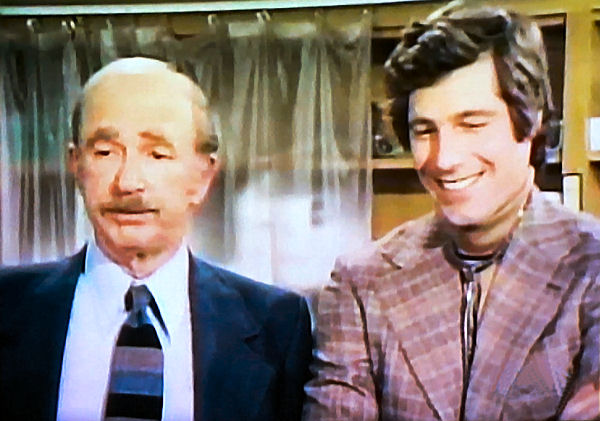
Thanksfully, some cases end well.
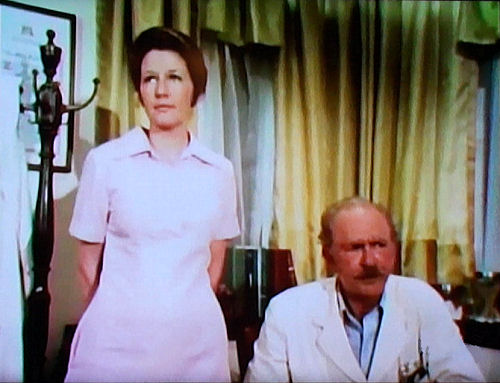
Wynn reacts to the whopping fib just told by Andrew.
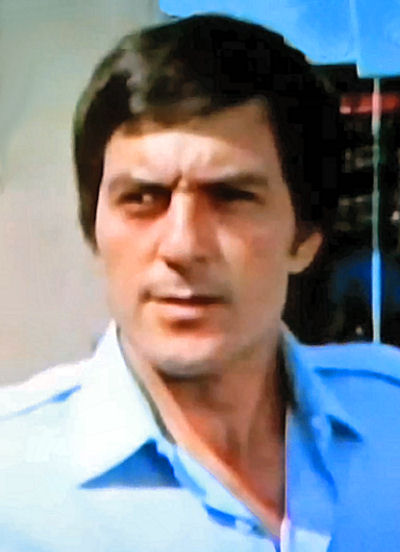
Ah, yes, the Dan Scowl. How could we forget?
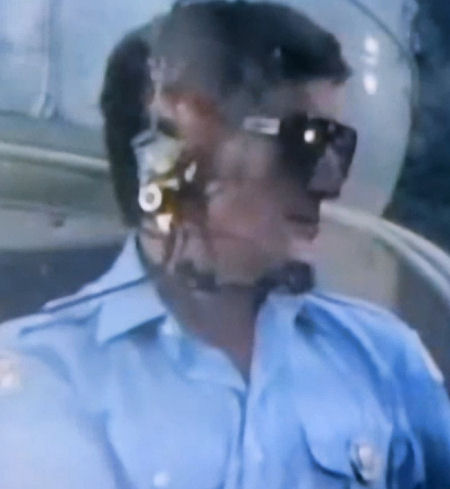
Dan flying his trusty "steed."
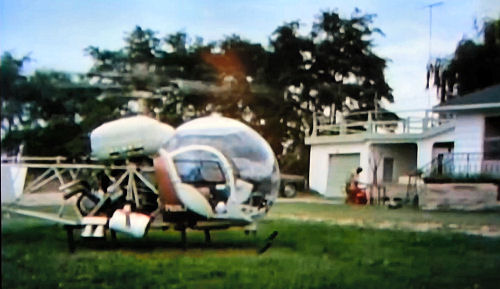
The Dixon Mills chopper has saved many a life.
The Location Today
I found these images on Flickr.
Valley Halla house today. The front has changed since the filming.
The home was built by the man who founded the Roman Meal bread company.
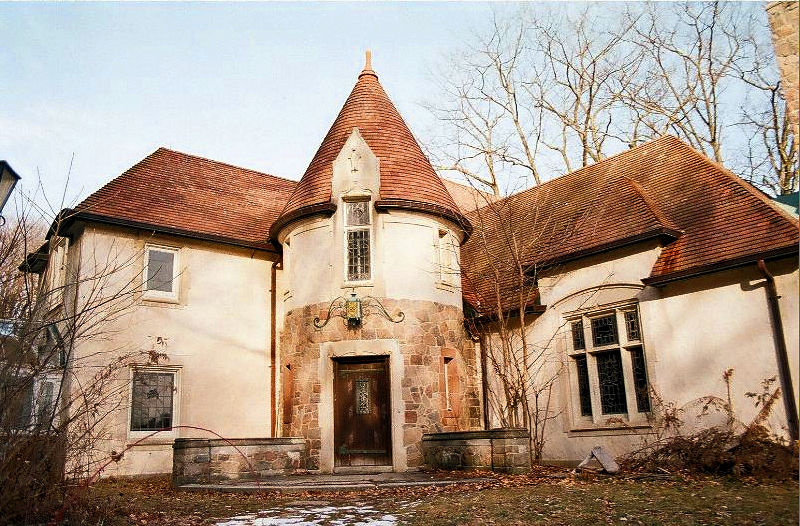
This stairway should look familiar.
Not sure what happened to the double doors on the right side of the hall.
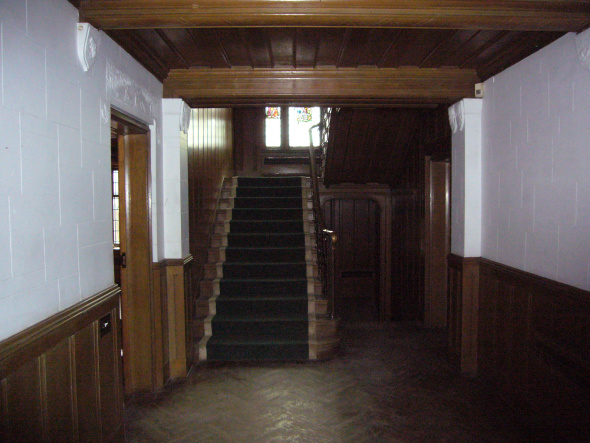
I'm sure this was one of the rooms shown on the series.
Those glass doors (kept curtained) are very familiar.
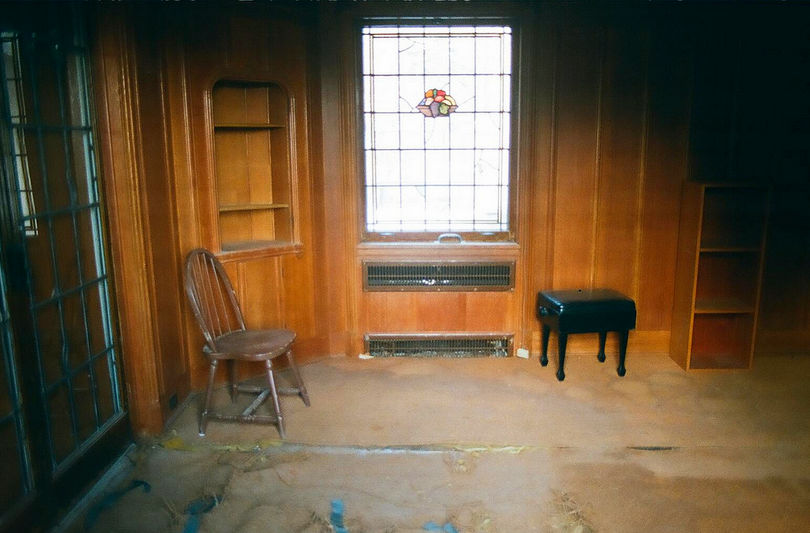
This is where we saw Andrew's roses in "Cortessa Rose."
This was attached to the house as shown in the episode.
We saw very little of the estate grounds; much larger than what was shown.
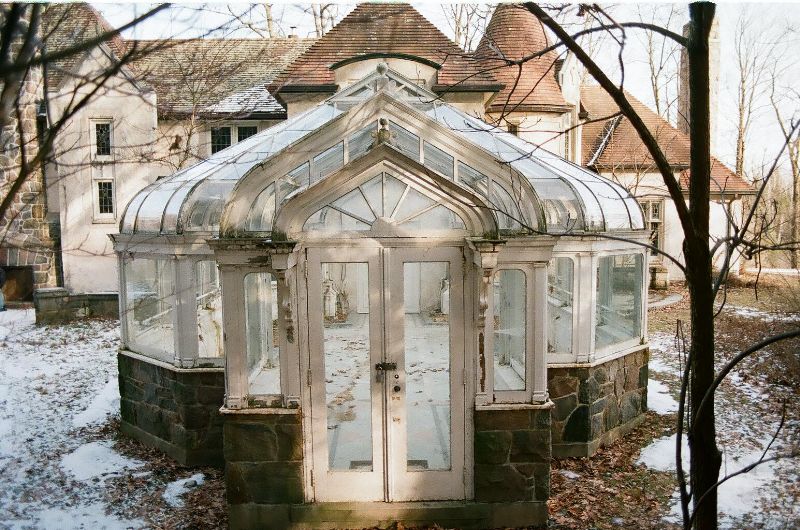
Video Lagniappe
Sam Groom in The Time Travellers:
Sam Groom as guest star on The Feather and Father Gang:
Jack Albertson on The Match Game:
Jack Albertson on the pioneer series Insight; "Sam," about the last human left in a world of robots:
Another Jack Albertson episode of Insight, "The Highest Bidder," in a very different role:
Len Birman guest stars on the classic Canadian children's adventure The Forest Rangers episode "A Christmas Story":
Part 1 of Lies My Father Told Me with Len Birman as the father (rest of parts are linked when you view this on YouTube):
Nuala Fitzgerald reads Chief Seattle's speech about living in harmony with nature:
- Google newspaper archive.
- TV Guide
- Better Angels Now episode list.
- TV Archive Canada episode guide.
- John Meredyth Lucas, Eighty Odd Years in Hollywood
- Two web pages I can't find any longer of Canadian television listings.
- With a big thanks to Rodney Walker for identifying that font! :-)
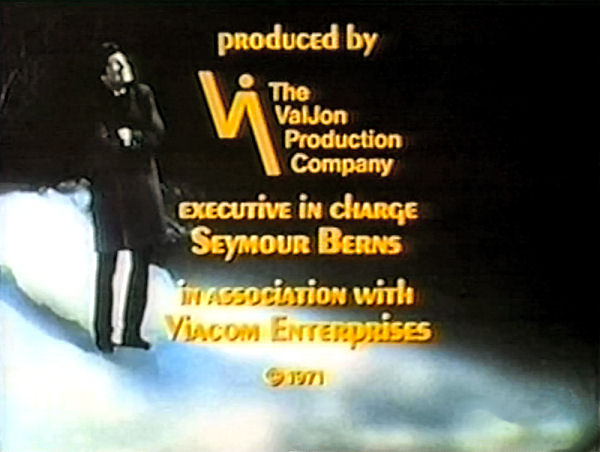
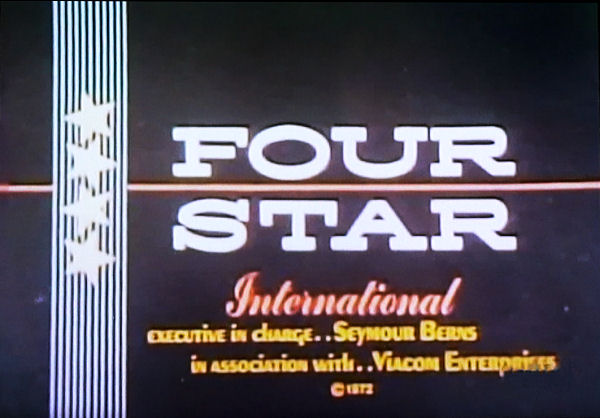
| Doctor Simon Locke is now the property of SFM Entertainment. It was formerly owned by Colgate-Palmolive. This is a fan page. No copyright infringment is intended. Any opinions stated are my own and do not reflect the thoughts of the actors, creators or producers. |
What the Heck Was [Is?] the Prime Time Access Rule and
What Did It Have to Do with Dr. Simon Locke?Back in the heyday of the "big three" American networks (NBC, CBS, ABC), "prime-time" network programming ran from 7:30 to 11:00 p.m. (with a 7 p.m. start on Sundays) Eastern time (earlier in the Central and Mountain states; delayed in the Pacific). The Federal Communications Commission then decided networks had too much of a hold on the local stations that carried them (and on the advertising revenue) and declared the networks could only broadcast three hours of network programming per night with Sunday as an exception. Before the local stations could shove in yet another rebroadcast of I Love Lucy, the FCC dropped the real bomb: what replaced the network programming must be original, not a syndicated rerun.
Ideally, the FCC hoped to re-establish those bastions of early television, the locally-produced shows, especially programs focussing on local problems in those socially-conscious Vietnam-era days. The local stations, of course, still did them: news and weather in the evening, morning and noon newscasts, the odd breakfast show and occasional public service broadcast—and knew the latter were usually the Kiss of Death in ratings. Their way out?—the FCC didn't require locally-produced shows in the slots, just new ones.
Granted, some of the local stations in larger markets did adopt some original local programming, but for most of them the closest they got was in purchasing group W Broadcasting's Evening Magazine (on a non-Group W owned station, the show was PM Magazine). Half the short, friendly little news items about people, places and things were produced by Group W and the local station added their own blurbs about area business, celebrities, restaurants, travel, etc. NBC's Today regulars Matt Lauer and Meredith Vieria both began as PM Magazine hosts in Providence, RI.
Most of the other programming was purchased from independent producers and were of these categories: game shows (Match Game PM, the evening version of daytime's 10,000 Pyramid, etc.); Hollywood-gossip/interview type shows (Rona Barrett, Army Archerd, etc.); British imports (Doctor in the House, The Adventures of Black Beauty, The Persuaders, and Family Classics, etc.); some musical/variety shows (Hee-Haw and The Lawrence Welk Show primarily); and an entire slew of cheaply produced (chiefly in Canada, where labor was less expensive) half-hour series like Young Doctor Kildare, Dusty's Trail, The Adventurer, Primus, and a nifty supernatural-and-horror-themed serial called Strange Paradise, which featured zombies way before zombies were "cool." It was this latter group of which Locke was a part.